 21/04/2012 12:33 21/04/2012 12:33 |
|
| | | OFFLINE | | Post: 24.701
Post: 7.231 | Registrato il: 28/08/2005
Registrato il: 20/01/2009 | Administratore | Utente Master | |
|


 See preceding page for earlier items posted FOR 4/20/12.
See preceding page for earlier items posted FOR 4/20/12.


 'Song of Praise':
'Song of Praise':
A birthday concert
for the Holy Father
Translated from

April 21, 2012
On Friday afternoon, April 20, at 6 p.m., the Holy Father attended a concert to honor him on his 85th birthday, presented by the world-famous Leipziger Gewandhaus Orchestra of Leipzig, one of the oldest orchestras in the world.
It was a present to the Holy Father from the Free State of Saxony and the City of Leipzig.
Music director Ricardo Chailly conducted a performance of Felix Mendelssohn-Bartholdy's Symphony No. 2 in B-flat major, also known as the Lobgesang (Song of Praise), for soloists, chorus and orchestra.
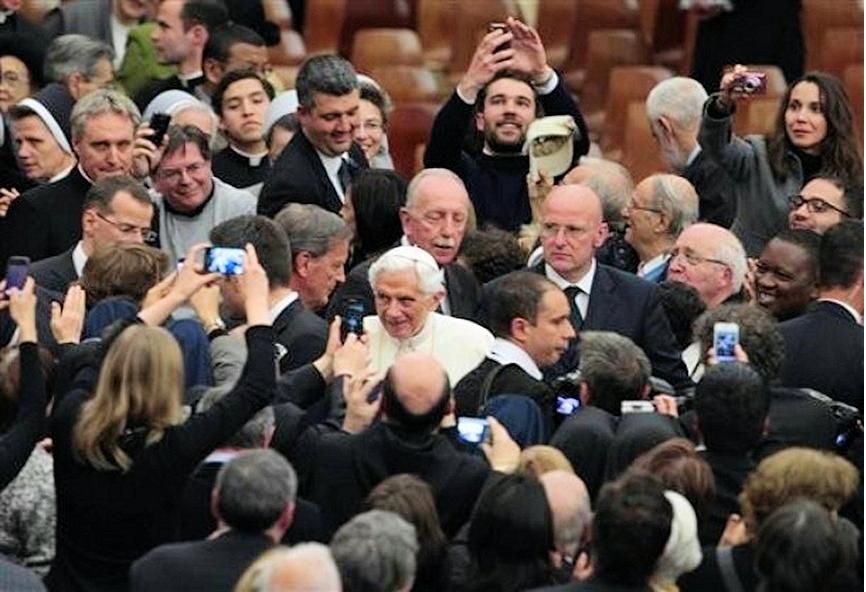
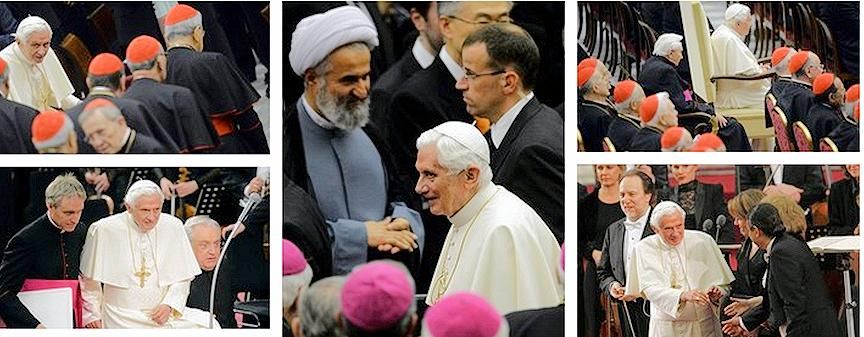
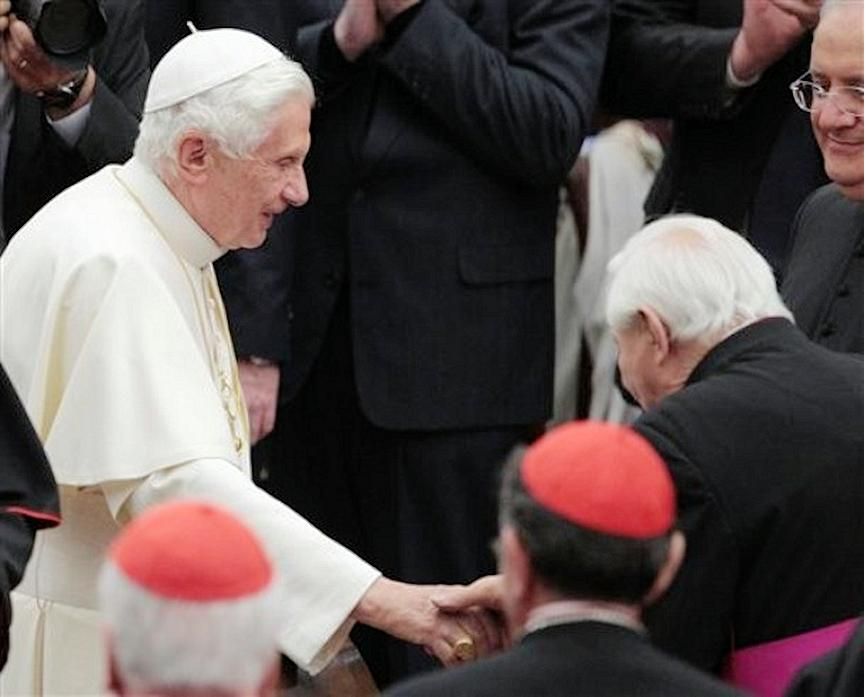
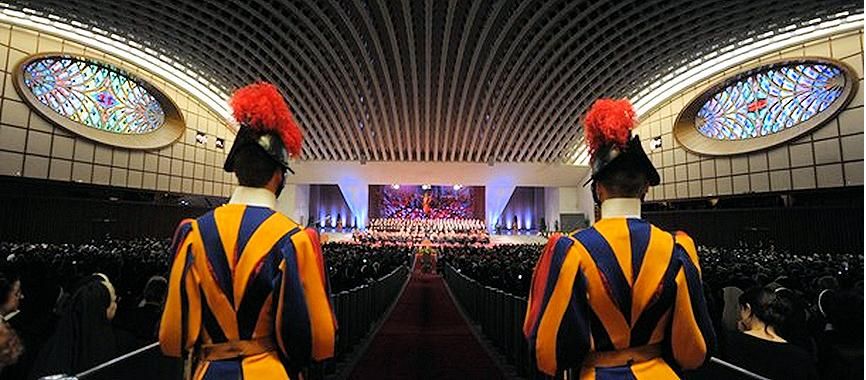
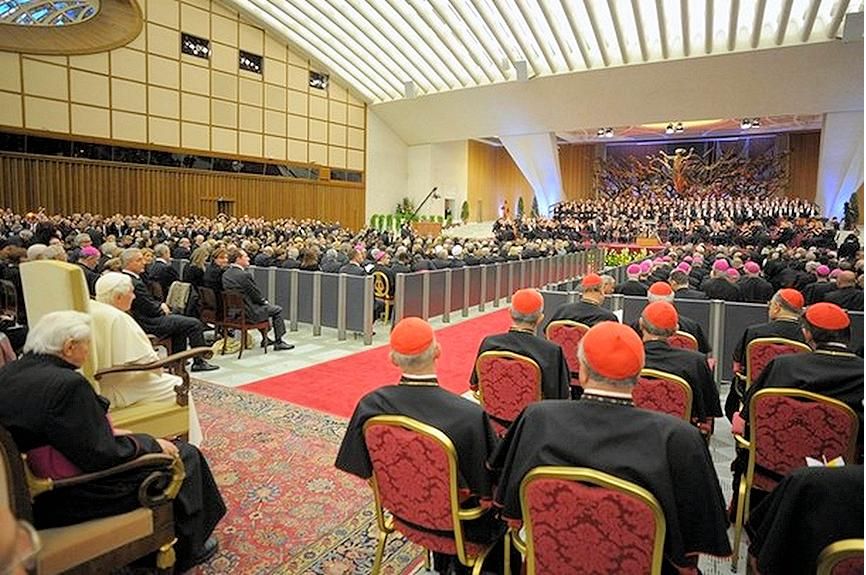

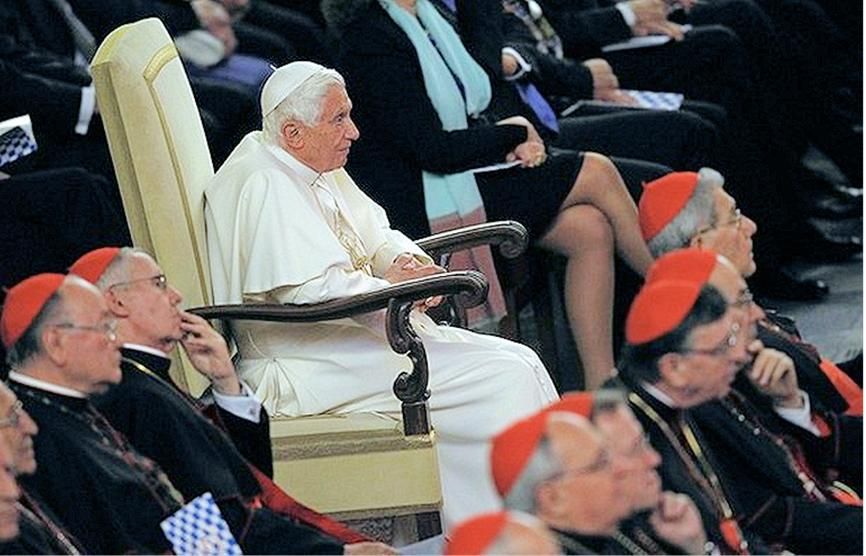
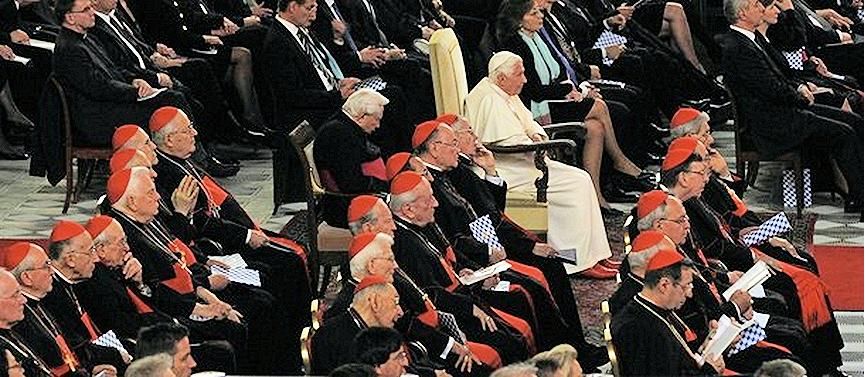
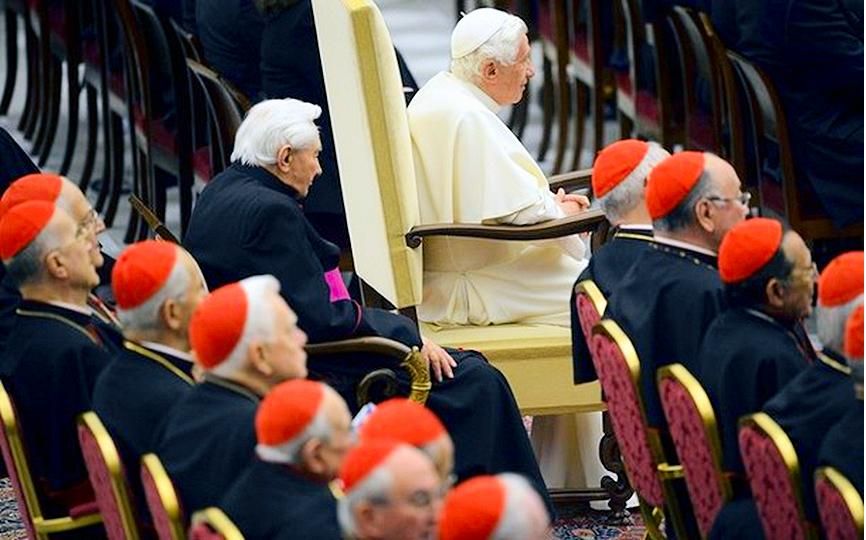
Here is a translation of the Holy Father's remarks after the performance:
Most Honorable Minister President,
Distinguished Guests from the Free State of Saxony and the City of Leipzig,
Eminences,
Venerated brothers in the Episcopate and Priesthood,
Ladies and Gentlemen:
He began in German:
With this splendid offering of Felix Mendelssohn-Bartholdy's Symphony No. 2, Lobgesang, you have made me - as to all those present tonight - a most precious gift for my 85th birthday.
This symphony is, in fact, a great song of praise to God, a prayer with which wee praise the Lord and thank him for his gifts.
First, however, I wish to thank all those who made this moment possible. Above all, the Gewandhaus Orchestra, which really needs no introduction - it is one of the oldest orchestras in the world with an excellent performance tradition and indisputable world renown.
Heartfelt thanks as well to the outstanding choirs and soloists, but most especially, to Maestro Riccardo Chailly, for their moving interpretation.
And my thanks to the Minister President and representatives of the Free State of Saxony, the Mayor and delegation from the City of Leipzig, the Church authorities and the officials of the Gewandhaus, and all who have come here from Germany.
He continued in Italian:
Mendelssohn, the Lobgesang Symhony, Gewandhaus: Three elements linked to each other not just tonight but from the very start. The great symphony for chorus, soloists and orchestra that we have heard was in fact composed by Mendelssohn to celebrate the fourth centenary of the invention of the printing press, and was performed for the first time at the Thomaskirche, the church of Johann Sebastian Bach, on June 25, 1840, by the Gewandhaus Orchestra. On the podium was Mendelssohn himself, who for years was the director of this venerable and prestigious orchestra.
This composition is made up of three movements for orchestra and then a sort of cantata with soloists and chorus. In a letter to his friend Karl Klingemann, Mendelssohn explained that in this symphony, "first the instruments give praise in their congenial way, followed by the chorus and the solo voices".
Art as praise of God - the supreme Beauty - was the basis for Mendelssohn's way of composition, and not just for liturgical and sacred music.
As Julius Schubring said, for Mendelssohn, sacred music per se was not a step above other music, but that each kind of music, in its way, must serve to honor God. And the motto that Mendelssohn wrote on the manuscript of the Lobgesang was: "I wish to see all the arts, especially music, in the service of He who created and gave them to us".
The ethico-religious world of our composer was not separate from his concept of art, but was an integral part of it: "Art and Life are not two different things" but one, he wrote. A profound unity that has its unifying element in faith, which characterized all of Mendelssohn's existence and guided all his decisions.
We see this common thread in all his letters. To his friend Schirmer on January 9, 1841, he wrote, referring to his family: "Of course, we do not lack for concerns and difficult days... Nonetheless, we can only pray fervently to God to keep us in the health and happiness he has given us". And on January 17, 1843, he wrote to Klingemann: "Every day I can only thank God on my knees for every good that he has given me".
Thus, he had a faith that was solid, deeply felt, and nourished profoundly by Sacred Scripture, which is shown, among others by his Oratorios on Paul and Elias, and the symphony we just heard, which is full of Biblical references, especially from the Psalms and St. Paul.
It would be difficult to cite all the intense moments that we have experienced tonight. But I would only wish to recall the marvellous duet between the sopranos and the choirs on the words, «Ich harrete des Herrn, und er neigte sich zu mir und hörte mein Fleh’n» (I placed my hope in the Lord and he bent down to me and listened to my plea). It is the hymn of someone who places all his hope in God and knows with certainty that he will not be disappointed.
He reverted to German:
Once more, I wish to thank the Orchestra and the Choir of the Gewandhaus, the Choir of the Mitteldeutschen Rundfunk [MDR, the Saxon broadcasting agency], the soloists and the Maestro, as well as all the representatives of the Free State of Saxony and the City of Leipzig for the presentation of this 'work of light', as Robert Schumann called it.
Through this, you have given us all the chance to praise God and in a special way, I can once again thank God for the years of my life and of my ministry.
He ended in Italian:
I wish to conclude with the words that Robert Schumann wrote in the magazine Neue Zeitschrift für Musik after having heard the first performance of the symphony we heard. They are an invitation on which to reflect: "Let us - as the text so splendidly set to music by the Maestro, ever more abandon works of darkness and take up the weapons of light".
Thank you to everyone, and good night.
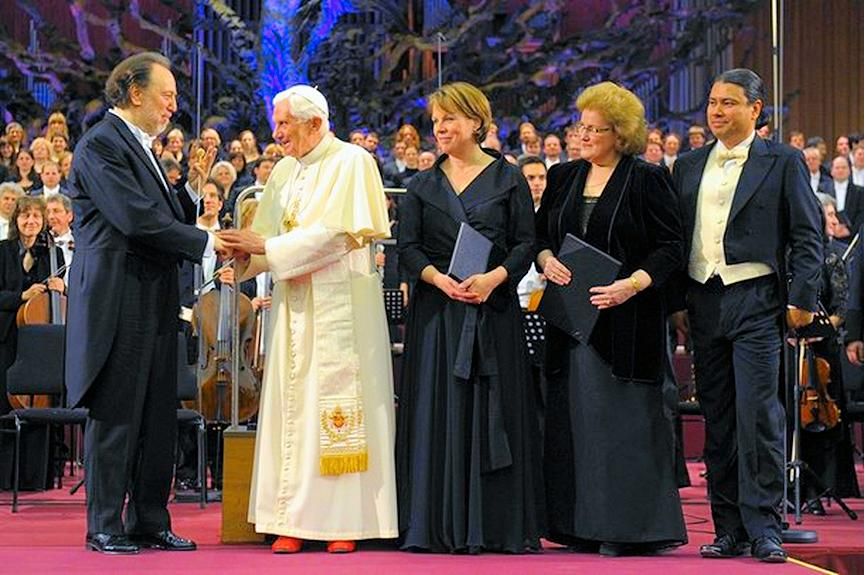
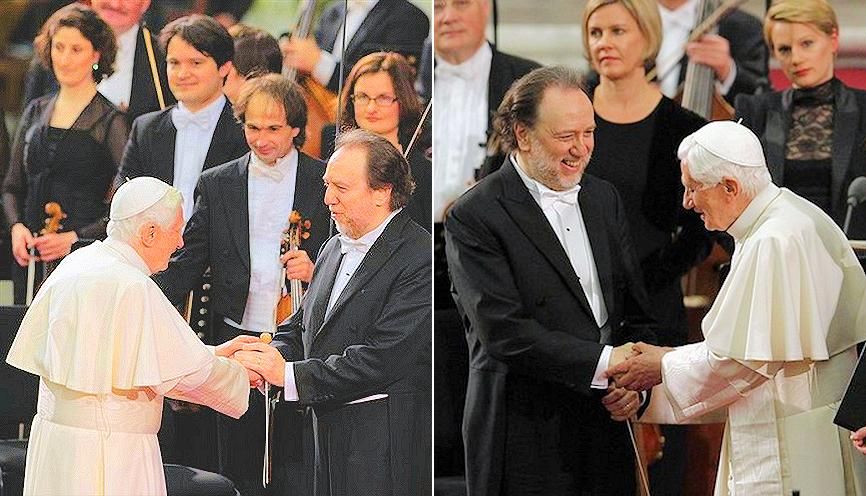
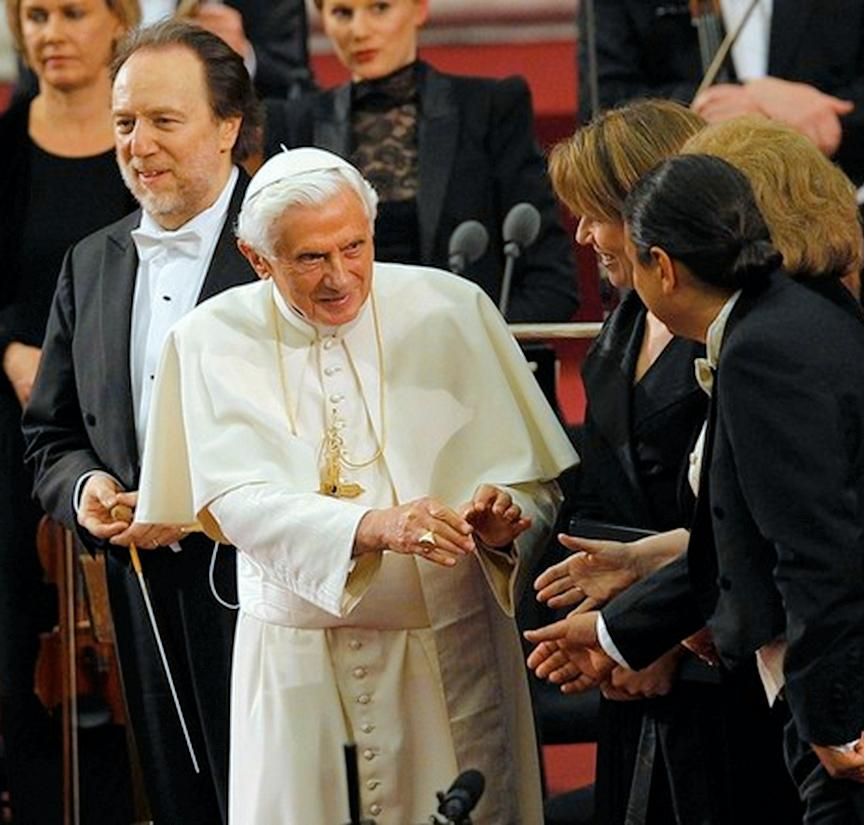
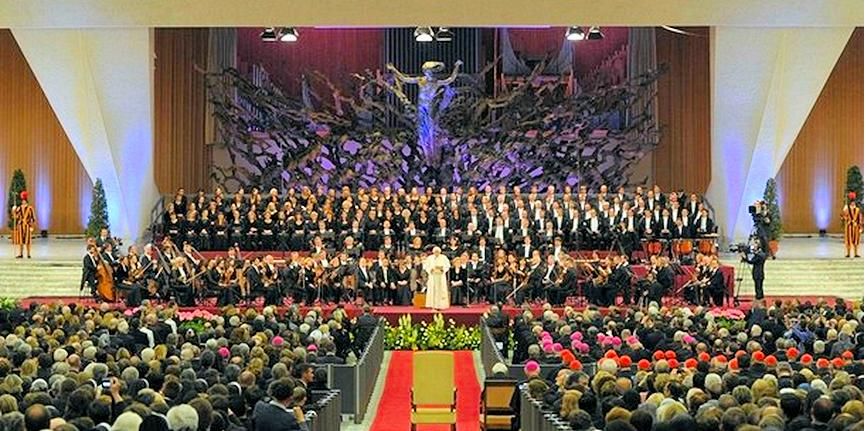
[Modificato da TERESA BENEDETTA 30/04/2012 18:44] |
| |
|
| |
 21/04/2012 14:54 21/04/2012 14:54 |
|
| | | OFFLINE | | Post: 24.702
Post: 7.232 | Registrato il: 28/08/2005
Registrato il: 20/01/2009 | Administratore | Utente Master | |
|
 Saturday, April 21, Second Week of Easter
Saturday, April 21, Second Week of Easter
 ST. ANSELM OF CANTEBRURY (ANSELMO D'AOSTA) (b Italy 1033, d England 1109)
ST. ANSELM OF CANTEBRURY (ANSELMO D'AOSTA) (b Italy 1033, d England 1109)
Benedictine monk, Abbot, Archbishop of Aosta, Archbishop of Canterbury, Doctor of the Church
Anselm first wanted to be a priest at 15 but his rich father opposed him, and so he spent the next 12 years of his life enjoying life to the full. During a trip to France, he came to the Benedictine monastery of Bec in Normandy, and joined the order at age 27. Within 15 years, he became its abbot, succeeding Lanfranc, who had been his mentor, quickly transforming Bec into a famous monastic school. He also started publishing his philosophical and theological works which were likened to St. Augustine's, in which he sought to analyze and illumine the faith through reason. Meanwhile, Lanfranc had been sent to England to help the English clergy in a much-needed renewal. As Archbishop of Canterbury, he asked Anselm to help him, and when Lanfranc died, Anselm was named to succeed him. It was 1093 and he was 60 years old. He spent the rest of his life fighting to defend Church freedom in England. Twice he was exiled by two kings for his opposition to them. Finally in 1106, King Henry I renounced his right to the conferral of ecclesiastical offices, the collection of taxes and the confiscation of Church properties. Anselm returned to England in triumph, devoting himself to moral formation of the clergy and carrying on his own theological studies. He is considered the father of Christian scholasticism. He died in 1109. He was canonized in 1492 and proclaimed a Doctor of the Church in 1720. Benedict XVI devoted a catechesis to him on Sept. 23, 2009
www.vatican.va/holy_father/benedict_xvi/audiences/2009/documents/hf_ben-xvi_aud_20090923...
Readings for today's Mass:
usccb.org/bible/readings/042112.cfm
AT THE VATICAN TODAY
The Holy Father met this morning with
- Fifteen US bishops from Region XI (various dioceses of California and nearby western states) on ad-limina visit
- Members of the US-based Papal Foundation. Address in English.
And in the afternoon with
- Cardinal Marc Ouellet, Prefect of the Congregation for Bishops.
The Vatican today announced many important nominations to membership in the Roman dicasteries, including
- Curial assignments for the new cardinals created last February.
- Cardinal Angelo Scola, Archbishop of Milan, and Cardinal Donald Wuerl, Archbishop of Washington, DC,
to the Congregation for the Doctrine of the Faith.
The Holy Father named Cardinal Giuseppe Bertello, President of the Vatican Governatorate, as his special legate
to the celebrations marking the millennial anniversary of the founding of the Sacred Hermitage of the Camaldoli
Benedictine order, on June 19, 2012, in Camaldoli, near Arezzo.
The Office for Papal Liturgical Celebrations released the calendar of liturgies to be presided by the Pope
from April to June this year.
Meeting of the Pontifical Commission for China
The Vatican Press Office issued this statement today:
From April 20-23, the Commission instituted by Pope Benedict XVI in 2007 to study the major issues relative to the Church in China, will be meeting at the Vatican.
Commission members include the heads of Vatican dicasteries who have competence in this sector, along with representatives of the Chinese episcopate and religious orders working in China.
Previous meetings had dealt with formation of seminarians, consecrated persons and priests. This year, they will consider formation of the lay faithful in the light of the situation of the Church in China and in the context of the Year of Faith to be marked by the universal Church from October 11, 2012, to to November 24, 2013.
They will also review progress made in the formation of priests, consecrated persons and seminarians, and what more needs to be done to insure they have adequate preparation for the tasks they will be called on to perform for the Church and the good of society.
See bottom of preceding page for recent stories about the Church in China.
 FSSPX expects Pope to decide
FSSPX expects Pope to decide
on reconciliation by mid-May
A lengthy press release from the German district of the FSSPX

says the Lefebvrians expect to hear a decision from the Vatican in May on their last response to the formula for reconciliation offered by the Vatican.
They expect the Pope to decide shortly after the Congregation for the Doctrine of the Faith holds its next plenary meeting on April 25, at which the FSSPX response will be on the agenda - so by the first half of May.
The release reiterates the brief statements released by the Vatican and the FSSPX on April 19, when the FSSPX answer was received at the Vatican. as well as the steps that have been taken by Benedict XVI to heal the rupture between Rome and the FSSPX.
It ends by citing the possibility that if the reconciliation takes place, the Vatican will most likely propose a Personal Prelature as a canonical structure for the FSSPX, similar to the Opus Dei.
- VATICAN INSIDER has published an interview with dissident lay theologian Vito Mancuso, a best-selling author in Italy for his liberal, anti-orthodox views on Catholicism. [However, INSIDER does not provide an English translation, so if you do not read Italian and care to read this kind of palaver, you may try the automatic translator - if you have the patience to decipher the gobbledygook that it sometimes comes up with, although the gobbledy is much less outrageous than the gook it translates!]
What I have read about Mancuso in the past several years (and statements made by him) has mostly outraged me with its smug arrogance. He personifies all those Catholic dissenters who decided one day that they were going to take on the 2,000-year-old Church because they know better than the Church - with all her Tradition, history and communion of saints - what the Church ought to be and what it ought to do. And I am very outraged that the person who interviewed Mancuso, Alessandro Speciale, was content simply to ask him his list of prepared questions, and did not once react to or challenge the outrages Mancuso glibly mouths and that have now been given free unchallenged rein in the INSIDER.
Let me just quote one of Mancuso's statements, commenting on the demands made by the Austrian dissident priests: "The Church should recognize that legitimate instances of self-realization (for women, and others) are not a priori contrary to the Gospel but could even be more evangelical than the formal obedience demanded by the Pope". Since when was Catholicism - or Christianity, in general - ever about 'self-realization', when selflessness, being the nature of love, as Christ showed the world, is the Christian ideal?
But I am glad that Mancuso thereby acknowledges the ego-driven ideas and actions of dissidents against the faith. I've said before that each dissident seems to think he's the next Martin Luther, except none of them apparently has the primary and overriding interest Luther always had in God. As the Pope told Lutherans in Erfurt last year, "That the question 'How do I receive the grace of God?'was the driving force of Luther's whole life never ceases to make a deep impression on me. For who is actually concerned about this today – even among Christians?"
I just checked again, in case my memory betrays me, the 'Call to Disobedience' by the Austrian priests, www.pfarrer-initiative.at/ [they now have English and other languages in addition to German, but they have not added significantly to their numbers - 405 as of April 14 - from the 300 that they started with in June 2011] and I do remember right: Nowhere in the statement is Christ or Jesus mentioned at all, and 'God' is only mentioned as in 'Word of God' in the sentence where they demand that lay people should be able to preach in priestless Masses. 'The Church' is what they mention most often because their demands are all about taking more power in the Church to themselves. No one can be more blind than egomaniacs fixated on a monomania as all dissenters in the Church seem to be.
[Modificato da TERESA BENEDETTA 21/04/2012 19:16] |
| |
 21/04/2012 15:18 21/04/2012 15:18 |
|
| | | OFFLINE | | Post: 24.703
Post: 7.233 | Registrato il: 28/08/2005
Registrato il: 20/01/2009 | Administratore | Utente Master | |
|

 Papal Foundation presents
Papal Foundation presents
the Holy Father with $8.5 million
to support his charities

April 21, 2012
Pope Benedict met and thanked the US-based Papal Foundation today for their contributions to support and help the Church in developing nations on his behalf. The Foundation is headed by7 Cardinal Donald Wuerl, Archbishop of Washington, DC.
During their annual audience with the Holy Father, representatives of the Foundation presented the Pope with $8.5 million to support charitable projects of the Holy Father.
The funds will help support 105 programs in nearly 50 nations on four continents. Grants include $500,000 to construct five schools in Egypt and $43,000 for construction of a health care facility and maternity clinic in the Democratic Republic of Congo.
Other projects include a soup kitchen in the Ukraine, the construction of a church in Angola, a health center in Malawi, and a new seminary in Peru. In addition, Saeman Scholarships will support theological studies in Rome for 59 seminarians, priests, religious and lay people from 23 developing nations so they may return to their home nations equipped to teach the faith.
Here is the text of the Pope's address to them, delivered in English:
Dear Friends,
I am pleased to greet the members of the Papal Foundation on the occasion of your annual pilgrimage to Rome. May your visit to the tombs of the apostles and martyrs strengthen your love for the crucified and risen Lord and your commitment to the service of his Church.
I am happy to have this occasion to thank you personally for your support of a wide variety of apostolates close to the heart of the Successor of Peter.
In coming months I will have the honor of canonizing two new Saints from North America. Blessed Kateri Tekakwitha and Blessed Mother Marianne Cope are striking examples of sanctity and heroic charity, but they also remind us of the historic role played by women in the building up of the Church in America.
By their example and intercession, may all of you be confirmed in the pursuit of holiness and in your efforts to contribute to the growth of God’s Kingdom in the hearts of people today.
Through the work of the Papal Foundation, you help to further the Church’s mission of evangelization, promote the education and integral development of our brothers and sisters in poorer countries, and advance the missionary endeavors of so many dioceses and religious congregations throughout the world.
In these days I ask your continued prayers for the needs of the universal Church and in particular for the freedom of Christians to proclaim the Gospel and bring its light to the urgent moral issues of our time.
With great affection I commend you and your families to the loving intercession of Mary, Mother of the Church, and cordially impart my Apostolic Blessing as a pledge of joy and peace in the Risen Lord.
Sr. Francis of the Sisters of the Immaculate Heart of Mary, Mother of Christ says she is an example of how investing in the future of one person means investing in the future of an entire nation.
Sr. Francis is from Northern Nigeria and she is the recipient of a Seaman Scholarship, founded by Papal Foundation stewards John and Carol Seaman.
Years ago the Seamans asked Pope John Paul II where their donation would be best invested. He replied that it was for the future of developing nations, more specifically in giving young men and women, religious and lay, access to top level education.
“This scholarship has really helped me a lot because I really suffered before”, she told Emer McCarthy. “Actually when I was asked to do this course in psychology I was quite afraid because we don’t have a community in Rome, so I didn’t know where I could live or how I would support myself”.
Sr. Francis says her Congregation, founded by Irish Missionary Charles Heery, focuses on empowering young girls and women in African society, through schools, orphanages, hospitals and clinics. “We train the young children, young girls but also young boys, not just academically but also spiritually to know God”.
“The study of psychology is going to be of immense benefit to us, not just to me particularly, to help my congregation and Church in Nigeria. We have many vocations to religious life in the Congregation…so we need competent hands, somebody who is well informed who will be able to help these young girls in their process of formation. And not just in the formation houses.
"When I go back to Nigeria, I will also be able to give a hand in the seminaries, in the psychological assessment of the candidates who wish to be priests, because our psychology course here in the Gregorian opens us, gives us many opportunities. And then I could also give help in the parishes in giving family therapy. I have so many areas I can help".
|
| |
 21/04/2012 15:44 21/04/2012 15:44 |
|
| | | OFFLINE | | Post: 24.704
Post: 7.234 | Registrato il: 28/08/2005
Registrato il: 20/01/2009 | Administratore | Utente Master | |
|


Year 8 of Benedict XVI's pontificate

April 21, 2012
Celebrations for Pope Benedict’s 85th birthday and the 7th anniversary of his election to the papacy have now come to their end. The people of Bavaria will continue their celebrations, as many were not able to come to Rome.
As the eighth year of the Pope’s pontificate begins, we wish the Pope all the best.
We share his hope that the dialogue with the Saint Pius X Fraternity will come to a resolution that bridges the gap without creating any new ones.
We wish him well as he delivers a message of love and hope for families around the world during his visit to Milan in early June.
It is our hope that dissenting groups will hear his invitation to be in communion with the Church and receive this invitation with respect and attention, and with an understanding of its significance.
We hope also that the journey towards renewal of the Church in Ireland, following an apostolic visitation to that country, will continue and intensify after the Eucharistic Congress in Dublin; and that, following the sexual abuse crisis, the Church may offer a genuine service for all society in the protection of children, with the commitment of the various Episcopal conferences, through healing, purification, and prevention.
We also hope that Pope Benedict’s journey to Lebanon may give him a chance to spread a message of peace amid the tragic conflicts in that region, and offer encouragement to the ecclesial communities who are being tried there.
Another wish is that the anniversary of the Second Vatican Council might be an occasion to promote the proper and objective understanding of the Council as a “compass for the Church of our time.”
We hope that the Synodal Assembly for new evangelisation will enrich the Church in its mission with creativity and impetus.
It is our hope that the Year of Faith will not only be filled with exemplary initiatives and beautiful celebrations, but that it will also promote a sense of renewal in the profound relationship between God, his Son Jesus Christ, and believers, against the ever decreasing awareness of the religious dimension of human life and mankind’s journey through history.
We also look forward to receiving the final installment of Pope Benedict’s work about Jesus.
Finally, the people of Brazil are busy in their preparations for the Pope’s visit to World Youth Day in Rio De Janeiro in 2013, which will take place during the ninth year of his pontificate.
Thank you, Fr. Lombardi, for a simple but very effective presentation of the agenda that our 85-year-old Pope has programmed for the eighth year of his Pontificate. The activities highlight the variety, scope and significance of his primary concerns.
For the record, here is a translation of the front-page editorial in L'Osservatore Romano on April 19...
Pope Benedict XVI is not alone
Editorial
by Giovanni Maria Vian
Translated from the 4/19/12 issue of

The eighth year of Benedict XVI's Pontificate begins. He was elected at the age of 78 on April 19, 2005, in less than 24 hours, by the largest Conclave in history.
This is a day of joy that has been carried over from the traditionally private observance of his 85th birthday on Monday, April 16. No Pope in the past century has reached this milestone, so it was celebrated with more warmth than usual.
Best wishes from around the world have flooded the Vatican for these April celebrations for the Pope, expressing affection and general esteem for Benedict XVI to a degree that was not foreseeable at the time of his election.
One must not forget the accumulation of prejudices, if not outright opposition, with which the quick decision by the college of cardinals was received in various circles, even in the Catholic world. [Almost exclusively in the Catholic world! Non-Catholics had no partisan interests or ideological causes invested in whoever was elected Pope.] Prejudices and oppositions against Cardinal Ratzinger dating back to the mid-1980s but which correspond in no way to his true personality nor to his record.
The man who succeeded John Paul II - who had been his most authoritative collaborator, whom the Polish Pope (himself more widely opposed in his time than people think today) had wanted almost immediately to be with him in Rome - came to be cited in contrast to him in stereotypes that became commonplace and over-used.
Thus, this has been a Pontificate that began with an uphill climb, but which this Pope has faced daily with lucid and patient serenity, having asked the faithful on that April 24 Mass that inaugurated his Petrine ministry, to pray for him so that he would not 'flee from fear of the wolves".
That homily was the first of what is now a long series that in terms of clarity and depth would not be outshone by the preachings of Leo the Great, the first Pope whose sermons were preserved. [Actually, Benedict XVI's first homily as Pope was the one he delivered in Latin at the Mass with the cardinal electors in the Sistine Chapel the morning after his election, which was just as memorable as his headline-making homily as cardinal in the Mass celebrated just before the Conclave began. Just consider that he wrote it, in Latin, in the night hours following his election, after dinner with the cardinals - and this is a man who regularly goes to bed early - in time to celebrate the 9 o"clock Mass the following day!]
His homilies are characterized by an exemplary equilibrium between classical heritage and Christian novelty, analogous to his intention to act always with a harmony of faith and reason. Addressed to everyone, as demonstrated in the meeting he organized in Assisi in October 2011, when a quarter-century after John Paul II had called the first Assisi gathering for believers, Pope Benedict also included non-believers, to announce the Gospel to today's world.
This was just as evident in his extemporaneous homily last Monday on the anniversary of his birthday which was also his baptismal day, and which fell on Holy Saturday in 1927. He spoke of the saints honored by the liturgy on that day - Bernadette Soubirous and Benedict Joseph Labre; of Mary, the Mother of God; and of the pure water of truth that the world thirsts for, even without knowing it.
Invisible friends who are no less real, whose closeness the Pope experiences in the communion of saints. Just as he experiences the friendship and affection of all those who pray for him daily, or who simply look at him with good will and listen to his words attentively.
Thanks to the site of the Archdiocese of Vienna, which carries this article written by Cardinal Schoenborn and published in the Austrian daily newspaper Heute on April 20.
Pope Ratzinger - personally
by Cardinal Christoph Schoenborn
Translated from

A few days ago, he celebrated his 85th birthday. Yesterday, it was seven years since we cardinals elected him Pope.
Much has been written about Pope Benedict XVI. Both sympathetic as well as critical.
Today, I wish to speak about him as a person. It has been 40 years since I first got to know Prof. Joseph Ratzinger. In 1972, I went for doctoral studies to Regensburg where the then already famous Prof. Ratzinger was teaching. He welcomed me into the circle of his doctoral students, and we have continued to meet every year with our former professor, who meanwhile had become Pope.
[Unfortunately, Schoenborn continues to perpetrate the mistaken idea that he was a doctoral student of Prof. Ratzinger in Regensburg. We have the words of Fr. Vincent Twomey, who was studying with Prof. Ratzinger at the time, and who, correcting the repetition of the untruth by John Allen in his 2000 biogrpahy of Cardinal Ratzinger, pointed out that Schoenborn, who already had his doctorate in theology from Paris, merely attended their doctoral colloquiums at Regensburg as a guest for two semesters. I checked Schoenborn's biography on the archdiocesan site, and it says, "In (schoolyear) 1971-1972, he completed his doctorate at the Institut Catholique de Paris, and in (schoolyear) 1972-1973, he spent a study year in Regensburg, where Joseph Ratzinger was his professor". So even his official biography seems to be deliberately misleading in this respect. ]
What has held this circle of some 50 former doctoral students together? Then and now, a fascination for his extraordinary gifts: an incredible memory, great personal simplicity and modesty, a rare spirituality, and clarity.
In these 40 years, he has always moved us by his attentiveness to each of us, for our families, our problems, and he never forgets whatever we confide in him.
That is why we are always surprised and pained at the negative image that has been painted of him in the public perception, with pejorative labels like Panzerkardinal, Grand Inquisitor and arch-conservative, used in the headlines. That is not the man we know.
One thing has always impressed us about him: He does not allow himself to be defined by public opinion. He goes his own way - serene, prudent and self-composed - with God and in his faith.
That is why we keep our loyal friendship with him. Even after 40 years. [That's rather lame! Why 'even after 40 years'. Aren't true friendships supposed to be lifelong?]
More importantly, one wonders why Cardinal Schoenborn does not follow the Pope's lead and not allow himself to be guided by public opinion as he apparently does - by the anti-orthodox preferences of his cafeteria-Catholic flock and clergy, and Austria's liberal media. Three of Lella's followers who read a news agency report about this article all had the same thought - the best service Schoenborn could do for the Pope would be to resign as Archbishop of Vienna - he's been there since 1995 - since he has failed his pastoral duties so miserably, with ever more dropouts and dissidence among his priests and lay parishioners.
Cardinal Tarcisio Bertone also wrote an article for an Italian newspaper, Il Messaggero, which was published on April 19, but the newspaper has a paywall that I cannot access. The OR reported sketchily on it the next day, with an abridged translation in English
www.osservatoreromano.va/portal under the title "The fraternity and imagination of a gentle man", which ought to warn you about the unidiomatic translation.... The articles by the two cardinals are rather disheartening to a Benaddict. My reaction was - "You've known him on an intimate basis all these years, and that's all you can say?" I don't doubt they are sincere, but their articles read like they were tossed off perfunctorily in the course of their busy schedules.
P.S. I have now translated the article about Bertone's article (because it also quotes from a radio interview given by Bertone on April 19), but I have added a couple of lines missing from the OR account that I found in a report by Edward Pentin in the National Catholic Register.
Cardinal Bertone on
Pope Benedict as he is -
not as the media depict him
Translated from the 4/20/12 issue of

A gentle and serene man, who is friendly and sincere even during work sessions, and who is never "tied to routine nor rigid, but is able to generate an atmosphere of brotherliness and of being imaginative"
It is the man Joseph Ratzinger away from the media clamor and spotlights about whom Cardinal Tarciso Bertone, Vatican Secretary of State - for years one of the Pope's closest associates - writes in the newspaper Il Messaggero on April 19, the anniversary of Benedict XVI's election to be the Successor of Peter.
"People are really mistaken," he writes in the page 1 article, "if they choose to see the Pope as someone who is focused only on his books and is detached from the real problems of man today".
He is, without a doubt, a person "of elevated intellectual and doctrinal profile", but above all, "he is capable of getting to the heart of a problem" and to present himself as 'an educator and exceptional teacher... especially for the younger generations".
Bertone's testimonial is that of someone who has met with the Pope almost daily for the past six years, and therefore beyond the pale of outworn stereotypes.
"Because of my work as Secretary of State, "I have had the chance to deal assiduously with the issues of the Church together with Benedict XVI, thus experiencing first-hand his personal capacities".
He says that one is most struck with "the consistency, wisdom and serenity of Benedict XVI, even if he is clearly aware of the problems that confront the Church and mankind. And what he says comes from his own completely lived experience."
Perhaps because of this, Bertone adds, "his teaching does not leave his listeners indifferent - neither the simple folk to whom brings the sense that God is near, nor educated persons who seek in philosophical and cultural confrontations a path to reflecting about faith, or even merely on the reality of man in the universe".
He praises the Pope for giving the world clear messages about essential human values and religious freedom, his appeal to people of all cultures and religions, his concern to defend the family and call attention to its needs, and his affection for young people "to whom he has been a true teacher of life and educator of the faith.”
The Vatican Secretary of State concluded by saying that Benedict XVI is leading the Church and confronting all the issues of major concern in the world, above all “the crisis of values.”
“Thank you Holy Father,” Cardinal Bertone said, “for your untiring ministry, for your humility and serenity. Ad multos annos!”
Cardinal Bertone also spoke about the human and personal dimension of Benedict XVI in a radio interview with Italian state broadcasting on Thusrday, April 19.
"The image that has been disseminated by the mass media," he said,"is unfortunately far from reality, although they are starting to know this Pope better - his wisdom, his sincerity, his consistency, I would even say his gentle sweetness." [He
uses the word 'dolcezza' which does not have a single-word English equivalent because it connotes gentleness, tenderness, sweetness, lightness all at once.... And as for 'starting to know this Pope better", the cardinal is surely 'making nice'! Does it take seven years for them to start knowing this man who has lived in Rome since 1981 and has been in the news for just as long? They'll never know him because they don't want to - they prefer to persist in the false image they have built up over two decades of him. The MSM has invested too much time and effort to peddle that fake portrait, and will continue, as they do, to withhold praise where praise is due, and to exploit every little peccadillo they can find in order to continue casting him and the Church in a bad light.]
To have portrayed him "as an armored tank (Panzer) is absolutely misleading and falsifying - he is a sweet and endearing man".
He also says, "Benedict XVI is not an isolated man. He is a man of relationships, starting with his closest associates. He is not isolated - he is always surrounded by faithful and committed co-workers". [That charge was always ridiculous anyway. If his daily contacts were limited only to his two secretaries, his valet, and his four housekeepers with all of whom he takes all his meals, and the daily meeting he has with Bertone and his chief deputies (for general affairs and for foreign relations), not to mention that he watches the primetime TV news in German and Italian, and reads six newspapers daily (not just the clippings sent to him by State), he would be more than well-informed - much better than Politi could ever hope to be - with points of view that range from the down-to-earth concerns of his valet and housekeepers to the specialized data and opinions conveyed to him by his Curial heads.]
Best of all, Bertone says, "he does not let himself be affected by rumors, by unpleasant reports, by shifting moods, not even by the hard incrustation of prejudices. He keeps himself informed, he asks, he listens, and is always discreet. Then he considers his options and waits for a decision to mature and consolidate itself. He leads the Church with a true charism for governance, facing the concrete problems not just of the Church but also of mankind - and I say that from experience".
[Modificato da TERESA BENEDETTA 22/04/2012 10:14] |
| |
 22/04/2012 08:13 22/04/2012 08:13 |
|
| | | OFFLINE | | Post: 24.705
Post: 7.235 | Registrato il: 28/08/2005
Registrato il: 20/01/2009 | Administratore | Utente Master | |
|

 On his blog, Luigi Accattoli reprints a center-spread article published in LIBERAL on April 17, which is among other things, an eloquent retort to those like his erstwhile fellow Vaticanista Marco Politi who obstinately and preposterously portray Benedict XVI as a self-absorbed man who has isolated himself by preference, abdicating his duties, as it were, by preferring to read and write.... And you can tell Accattoli worked on this article - he did not just toss it off...
Let me tell you about Benedict XVI:
On his blog, Luigi Accattoli reprints a center-spread article published in LIBERAL on April 17, which is among other things, an eloquent retort to those like his erstwhile fellow Vaticanista Marco Politi who obstinately and preposterously portray Benedict XVI as a self-absorbed man who has isolated himself by preference, abdicating his duties, as it were, by preferring to read and write.... And you can tell Accattoli worked on this article - he did not just toss it off...
Let me tell you about Benedict XVI:
He is not solitary, but
the soloist in an ensemble
by Luigi Accattoli
Translated from

April 17, 2012
Benedict XVI is not a Pope as many think who is surrounded by a hostile Curia. Nor is he a solitary Pope by temperament: But he is a soloist by choice and in his way of governing. [Soloist in the musical sense, where one plays a distinct solo role in relation to but part of an ensemble performance.]
This soloist Pope turned 85 yesterday, years which he carries very well. We saw him move agilely, with slight assistance from his acolytes, during the long telecasts of the Holy Week and Easter liturgies - his eyes thoughtful and concerned, his steps light as usual but more careful now, and his words vivid as ever.
He suffers from a weakness in the right hip, and last October, started using the moving platform that had been used by Papa Wojtyla. And he is no longer able to perform the prostration before the Cross on Good Fridays [as he did in his earlier years as Pope].
But all this merely speaks of his age: He was elected Pope at 76, and on Thursday, he enters the eighth year of his Pontificate. No other Pope in the past 100 years has lived be 85. Pius X lived to 79, Benedict XV t0 67, Pius XI to 81, Pius XII to 82, John XXIII to 81, Paul VI to 80, Papa Luciani to 65, and Papa Wojtyla to 84.
Benedict XVI's overall physical shape is demonstrated by his travels and by his many public commitments. He withstood the recent trip to Mexico and Cuba very well. On Easter, we saw him celebrate Mass at night and then again in the morning, for a total of six hours within a 14-hour period.
He will be going to Milan for the World Encounter of Families the first three days of June, and on September 14-16, he will be in Lebanon. (Where he will deliver to the bishops of the Middle East his Post-Synodal Apostolic Exhortation* that synthesizes the conclusions of the Synodal Assembly on the Middle East in October 2010).
The visit to Mexico, a country caught up in the tsunami of drug trafficking, and to Cuba in the twilight years of the Castro brothers, and to the Middle East next September, in the aftermath of what was supposed to be an 'Arab spring', are extraordinary undertakings, but the following months will see the maturation of other signal commitments on the Pope's agenda: from the Synodal Assembly on the new evangelization in October, to the opening of the Year of Faith to mark the 50th anniversary of the opening of Vatican-II.
This year may also see the publication of his encyclical on faith to complete a trilogy on the cardinal virtues, after Deus caritas est on love in 2006, and Spe salvi on hope in 2007.
Also in 2012, we should be seeing the publication of the third and last volume of JESUS OF NAZARETH, signed Joseph Ratzinger/Benedict XVI, after the first two volumes published in 2007 and 2011. This will be dedicated to the birth and early years of the Nazarene, where the first two dealt with the public ministry of Jesus and then his passion, death and Resurrection.
This trilogy on Jesus is a work of major importance on which, first as cardinal and then as Pope, he has dedicated at least ten years of work. In his Preface to Volume 1, the Pope says he began writing the first volume during his summer vacation in 2004, and completed it after he became Pope, 'by using all his free time'. And so, we have the unprecedented fact, in the modern era, of a Pope who has published a theological work aftr becoming Pope.
It is relevant to how he has returned the figure of the Pope to its apostolic dimension and to preaching, with less emphasis on governing the Curia and the bishops - a displacement from governance to mission which has concerned all the Popes of our time, from Pius IX, and which made great progress with the Popes of the Council and after the Council.
His focus on Jesus is equally relevant to the degree of approval for the Pope within the Catholic world, where the appreciation of his teaching is great, whereas there persists a prejudice about his work of governance, despite the points he has gained in recent years with his excellent decisions regarding the pedophile-priest scandal and with the financial reforms in the Holy See.
Whoever still finds it difficult to like Benedict XVI - because of the image that the media had built of Cardinal Ratzinger as a 'fierce watchdog of the faith' for at least two decades before he became Pope - ought to read his books on Jesus. What greater thing can we expect of a Pope than to speak to us of the Nazarene?
Many point out that the Pope must 'nonetheless' govern, and that a Pope who publishes books and writes his homilies by hand ends up delegating governance to the Curia. It's a schematic idea that comes from the past.
It was said of Papa Wojtyla that he was busy being missionary to the world, leaving the routine governance of the Church to the Curia. And they say that now of Papa Ratzinger, that he keeps to his writing and relies on the Curia to do the work. But the analogy does not work.
I firmly believe that Benedict XVI must be given credit for having complete awareness at all times of the issues facing the Church - he spends hours at his desk studying files and reports - to take an example, in the naming of bishops.
It now seems clear that the uproar caused by the chattering crows at the Vatican - which seems to have quieted - was due to the Pope's decisions to institute financial reforms. In other words, it happened because the governance was too strong for some, not because there was no governance.
And in the matter of communications, as someone who is in the business, I can only find one difference of this Pontificate compared to the previous one, which however is not necessarily negative.
We have, as I said, a soloist Pope who nonetheless still has a Curia, substantially the same Curia as it has always been [in terms of function, not in its major players) but it is no longer the sort of court that previous Popes had, who could trip up the Pope and impose their conditions, but rather help foresee, predispose and accompany papal activities.
I would say that the delta-like outflow of communications under Papa Wojtyla helped prepare the terrain for a detailed and relatively flexible reception of papal initiatives by media operators, whereas the estuary-like outflow [i.e., narrower] characteristic of Papa Ratzinger predisposes to media outcomes in which he does not have a safety net - either the reception is successful because of surprise effect and/or by consensus, or it goes very badly because a lack of concerted effort prevents taking negative eventualities into account.
And on the fact that this Pope is a soloist but not solitary, we can cite what he told newsmen in March 2009 on the way to Cameroon: "I don't feel alone in any way. Every time, I receive working visits from mu closest collaborators... I see all the Curial heads regularly, almost every day I meet with bishops visiting ad limina... Recently we had two plenary assemblies if these dicasteries. Then I have my contacts with friends, a network of friendship. Those who were ordained with me recently came to visit... So being alone is not one of my problems. I am surrounded by friends and I have a marvellous working relationship with bishops, my associates, and assorted laymen, and for this I am grateful".
He listens a great deal, to everyone, but he then decides by himself, and in this sense he is a soloist.
There are even those who claim that he does not have an adequate perception of the crisis in the Catholic Church, but this too is false. We have the curious situation of a Pope who says more negative things about the Church in his homilies than even his critics do with their pamphleteering. [The important difference is that he couches these criticisms of the sins within the Church in gentle pastoral, 'tough love' terms, not as imprecations.]
These critics - let us say Hans Kueng, or the We are Church movement, or the Austrian priests who issued a 'Call for Disobedience' - always say that things wouldn't be going so bad for the Church if only she had the courage to make some reforms - i.e., more democracy in Church affairs, a more active ecclesiastical role for the laity and for women, a more positive tone in preaching [Surely no one can fault Benedict XVI for his preaching, which is always positive even when he criticizes! It's the dissident priests who are relentlessly negative - if not against the Church, then in pursuing their liberal political causes], and less preoccupation with the prevailing sexual culture and with bioethics.
On the contrary, Pope Benedict maintains that the crisis in the Church is even more profound and that no organizational updating or preaching will remedy anything unless first there is a recovery of faith.
He spoke about this strongly in his address last December 22 to the Roman Curia, which was already feverish over internal issues which would then come to the light with the seeming gusher of confidential documents that would be leaked from the Vatican. [It only seemed 'massive' at the time, because of the undue feeding frenzy in the media, but in fact, there were at most eight such documents that have come out so far, none of which were really major, but by their nature 'scandalous' enough for the media to exploit them as such! The most headlines were generated by the three documents which are for the most part made up of wild partisan charges, gossip and absurd speculation - the Vigano letters and the anonymous memorandum alleging, among other things, a plot to kill the pope.]
He spoke of 'the crisis of the Church in Europe' which arises from 'a crisis of faith', which he described as a 'fatigue' and 'the tedium of being Christian - strong terms, and hardly 'inadequate perception' by the Pope. [Who, among other things, had already written quite a few books and many essays about the crisis of Europe, before he became Pope, in piercing analyses that leading intellectual figures in the secular world found perceptive - precisely - and challenging.]
Last Maundy Thursday, with the same dramatic effect, he addressed the call to disobedience by some Austrian parish priests as 'a desperate urge to do something'.
So the poor Pope has, on the one hand, these 'disobedients', and on the other, the Lefebvrians who, up to this point at least, have appeared to reject the hand he has held out to them.
But the tragedy is not in such tensions and ruptures. Rather it lies in the abandonment of the faith by so many. and by the filth committed by those who have distorted the face of the Church.
It is the Pope's call to penitence and for reform to start with individual purification. From this critical overview of the state of the faith, he has taken the attitude of radical trust in God, which he expressed in a most explicit way in the invocation that he pronounced at this last Christmas Eve Mass, perhaps the most beautiful of the prayers he has proposed since he became Pope.
He developed it from a verse by the prophet Isaiah who announced the birth of a 'son' who would liberate the People from the oppressors' boots, cloaks and rods:
At this hour, when the world is continually threatened by violence in so many places and in so many different ways, when over and over again there are oppressors’ rods and bloodstained cloaks, we cry out to the Lord:
O mighty God, you have appeared as a child and you have revealed yourself to us as the One who loves us, the One through whom love will triumph. And you have shown us that we must be peacemakers with you.
We love your childish state, your powerlessness, but we suffer from the continuing presence of violence in the world, and so we also ask you: Manifest your power, O God.
In this time of ours, in this world of ours, cause the oppressors’ rods, the cloaks rolled in blood and the footgear of battle to be burned, so that your peace may triumph in this world of ours.
*[It's a bit off-topic, but this is an occasion to say something about the post-synodal exhortations which are typically published two years after the event. I think we all fail to appreciate the effort that the Pope must put into these exhortations. Moreover, Sacramentum caritatis, on the Eucharist, Verbum Domini, on the Word of God, and Africae munus, on the special assembly on Africa, are all major and powerful documents of the Papal Magisterium that have simply been overshadowed in attention by the encyclicals. But they are no less significant (and beautifully written)as Magisterium - and a truly collegial act, rather than just a personal one - since they incorporate what the bishops of the world have concluded and recommended.
Each document must require a great deal of work - hence the two years gestation - since the Pope has to explain each of the dozens of recommendations made by the Synod, tie them together theologically and doctrinally, and then make concrete pastoral directives to carry out the recommendations. It's daunting!
Sometimes I think that even the bishops and priests, to whom these exhortations are primarily addressed, forget to refer to them constantly as they should. Or may never have read them, just as the vast majority, I suspect, of all those who profess to be 'the spirit of Vatican II' have never bothered to read the Vaticna II texts and have simply been attributing - wildly and without foundation - their own personal and ideological ideas about the Church to Vatican II.
[Modificato da TERESA BENEDETTA 22/04/2012 08:29] |
| |
 22/04/2012 16:43 22/04/2012 16:43 |
|
| | | OFFLINE | | Post: 24.707
Post: 7.236 | Registrato il: 28/08/2005
Registrato il: 20/01/2009 | Administratore | Utente Master | |
|

 Sorry for the delay in posting this, but it took some time to translate.
Benedict XVI and the time
Sorry for the delay in posting this, but it took some time to translate.
Benedict XVI and the time
of the authentic believer
An interview with Peter Seewald
Translated from

MUNICH-ROME, April 16 (kath.net/ps/rn) - Here is an exclusive interview with Peter Seewald on the occasion of Pope Benedict XVI's 85th birthday:
Mr. Seewald, 85 years of Joseph Ratzinger. seven years as Pope Benedict XVI. Is that a reason for jubilation?
For jubilation, perhaps not. But certainly, for joy. No one more than this Pope has made it possible not just to gird the Church for the challenges of our time; to show how to defend herself, and how to find the way back after a time of disorientation. One must not overlook that the world is going through a crisis that is truly tragic. But the spread of unfaith is, of all the ailments of civilization, the most dangerous. Because when faith goes, society cannot do well.
Recently, an Italian Vaticanista ventured to say that perhaps Ratzinger should never have been elected Pope ]the usual villain - Marco Politi].
The truth is that there was no other choice. Joseph Ratzinger helped create John Paul II's Pontificate. He was the best known and most fascinating cardinal worldwide. No one had a better knowledge of the Curia. In almost 25 years, he had become a Roman. He speaks nine or 10 languages. He is a whole very well-rounded, educated person. He already had international renown as one of the greatest theologians and important thinkers of our time. And, and, and. [And his personal holiness was clear to all and indisputable.]
Of course, there have been errors in the past seven years. But the very fact alone that, after a man like Wojtyla, he was able to shift in such a refined, almost elegant way to his own Pontificate without any gaps, is a herculean feat.
What distinguishes him especially?
A lot. His tirelessness, his fire, his self-sacrifice, his human kindness. At a time which is Godless and depressed, he places high value on praising God. Where believers and priests have fallen into activism, he shows the continuity and the true sources of Christian faith.
For him, catharsis is always the start of anything new. What can seem like a breakdown into mouldering rubble can also be seen as humus for new sowing.
Benedict XVI is not just the Pope of a Renaisssance of Christian origins - he also exercises the Petrine primacy in a very ecumenical way. which makes it easier for other confessions not to see the Bishop of Rome as a rival but as a symbol for the great mission of Christian unity.
It is said that public consensus was much greater for his predecessor.
Well, at least in his general audiences, he has attracted a much greater public. On his trips, even in Mexico, he is greeted enthusiastically by millions. No politician and no popstar is able to do that.
And it was quite a sight to see in Cuba the greying Commandant Fidel Castro - who appears to have come a long way from rejecting religion as a Marxist revolutionary to what appears to be a rediscovery - now requesting the Pope to recommend books for his spiritual reading!
The critics also say that Benedict XVI is not modern enough. [Too bad this interviewer seems limited to bringing up hoary chestnuts!]
But whoever can put aside the cliches and look more carefully will be surprised. At a time when nonsense. unreason and sheer lunacy are increasing exponentially, the Church is led by someone whom one can call the Pope of Reason.
In a time when the intellectual class is ruined and the public discourse has become even more dumb, an exceptional intellectual sits on Peter's Chair. Bu it is someone who does not stop at purely rational thought, but shows how out, of the symbiosis between knowledge and faith, come wisdom, beauty and truth.
And while the whole world appears to be intent on renouncing truth, the Pope stands firm, pointing to the eternal Truth that man should not lose sight of.
Benedict XVI is above all one of the humblest of Popes. He thinks that non-violence and love are the greatest forces that can work on earth. He is stripping the Papacy of its false attributes, of any lust for power. Indeed, here is one who asks of his Church to be powerless, to give up privileges that had always been sought.
Namely, „Entweltlichung“.
One wonders why this idea sounds so false to us or is not even understood. Nothing is farther from the Pope's mind than for the Church to build its own little special world. 'Enweltlichung' - giving up worldliness - does not mean running away from men, but a rejection of power, of Mammon, of cronyism, of counterfeit, of deception and self-deception.
Joseph Ratzinger used these very terms in an essay entitled „Vorgang der Entweltlichung der Kirche“ (A process to rid the Church of worldliness). He believes this is necessary so that the faith can once more unfold her active principles.
'Entweltlichung' is not about turning your back on social and political involvement, and certainly not a rejection of the Christian virtue of charity. It means to be able to resist the world, to show that Christianity is bound by an ideal that goes far beyond every purely worldly and material world view.
Benedict XVI embodies, in this respect, the time of the authentic faithful, who will no longer wave the standard of "We-are-only-doing-this-as-if...' but rather "We will do it', even when we feel weak, and even when we fall again and again, to always start again.
Der Spiegel had a cover picture of Benedict XVI in 2009 as 'Die Entrueckte' (Out of this world), in 2010, as 'Der (un)Fehlbare' [The (in)-Fallible); and in 2011, as 'Der Unbelehrbare' (The Unteachable).
The 2012 cover is still to come. It might well read „Der Starrsinnige“ (The Stubborn), because he does not dance to any piper's tune. He is one of the last representatives of a high culture of education and intellectual endowmen that was once known by the expression 'German genius' and was a worldwide wonder.
Today, what we have is the fear of not conforming enough. One lives to get nothing but flattering feedback, even if it should be at the cost of truth or fairness. The Pope is not tempted at all. In that way he is inconvenient to others, he does not fit; in fact, he is not in the main stream.
For him, the question is not, What is modern?, but What is appropriate for the future? And how can we manage to still have a future? Is it really progressive to follow ill-considered fashions which are not even compatible with the basic order of Creation? Don't we need a new age which will be distinguished by responsibility through a lifestyle that helps us save our souls and not bring an end to this wonderful and beautiful planet earth?
How about that Pope Benedict stands in the way of progress and that he is an enemy of the modern?
They also said that of Papa Wojtyla. Until almost everyone started to realize that his contribution to bringing down the man-hating systems of Eastern Europe cannot be appreciated enough.
Meanwhile, what does the 'modern' look like? In the face of so many mistakes, has it not become a bone of contention itself? Of course, the Pope is old. But precisely from the experience of the past century and his Biblical outlook, he stands by his judgments. Wherever man feels even more in distress, he can offer a a means of healing that basically cannot be beaten.
What do you mean?
The Church no longer has great institutional power. Her remaining spheres of influence are subject to feuds, to mockery, and increasingly, to persecution. The Church, in this way, will seem more Christlike. It's a paradox that she both wins and loses. But the institutional weaknesses of the Church correspond to an interior reinforcement of the papacy. People are looking for support, a spiritual father whom they can trust and whose word is reliable. Do not build on sand, Jesus said, but build on rock.
He found his fit in the Papacy quite fast.
And no one thought that possible. There is a significance in that Benedict's birthday and papal anniversary fall so close together. The three days in between were needed for the rebirth of Joseph Ratzinger from defender of the faith to the shepherd of believers.
It is noteworthy that all his work is in the sign of service. Humility - after the great signs of truth, faith and love - is a stamp of this Pontificate. Very much like the motto that he chose for his ordination as a priest: "We are not masters of your faith but servants of your joy".
He is also called the theologian-Pope.
But that is so inadequate. He personifies, on the one hand, a new intelligence in the announcement of the mysteries of the faith; and on the other hand, he is not a typical scholar, who writes weighty tomes with millions of footnotes, obsessively attentive to the least detail.
A primary concern for him is to reach the hearts of men. He takes that very seriously, but he does it easily - without taking away the mystery of what is great, and without trivializing the sublime.
Has he changed much in seven years as Pope?
With Joseph Ratzinger, everything seemed to have been just right from the earliest years. Not in the sense of being average, but that he early found his center of gravity. That goes for his teaching and his attitudes towards theological issues or questions of Church policy.
That goes also for his temperament. He is always 'in touch'. And with his equability, he is not only very incisive, he is also very efficient. He has hardly changed in this nor in his simplicity and likeable ways. On the other hand, the office and the person have become so fused together that they can no longer be distinguished.
How is that demonstrated?
He feels, as he himself has said, not just the singular grace of the office, but that he must transform his entire person, as much as he can, to become what he has accepted to be.
he defines the Vicar of Christ not as a function that has anything to do with might and fame, but rather as a chance to show exactly who Christ is. In the same way as one must see the Father in Christ, so one must see Christ in the Successor of Peter.
When he looks back at 85 years of his life, what would stand out especially?
Above all, an unparalleled continuity in his work from the very beginning to now. Whoever reads his early texts will already have a full-grown Ratzinger before him, one who never had to correct his texts which continue to read very contemporary today.
On the other hand, Joseph Ratzinger was also someone who had other sides - he could be rebellious, as his school certificate shows, despite his shyness. Someone who was confident enough to stand up to the harassment of a Nazi officer as he would later to a vain theology professor who was a star in his field.
He resisted the call to become a bishop, he resisted the earlier calls to come to Rome, he resisted the call to Peter's Chair. But precisely these road signs of developments which were totally against his will spelled a destiny that obviously someone else held in His hands.
What were his early concerns?
Two above all - truth and love, because for him there can be no love without truth, nor truth without love. Love was the central word of his theological North Star, Augustine, for which reason was called 'the genius of the heart'. And love was, of course, the subject of his first encyclical.
Was his work on Augustine also the basis for his ideas on the Church?
Yes. He sees the Church as a field in which both wheat and weeds grow. Augustine said that the Church is very often a 'church of sin', that one had to ask whether there was an upright man to be found. But this assembly is part of the Sacred Mystery. It is therefore necessary for the Christian to defend himself from temptation, in order to establish a Church of the pure, an exclusive community that excludes others and that can no longer keep the gates to God open.
What was his driving force?
He was never interested in building a career in the bourgeois sense. He has always lived with the simplicity of a monk who has never sought luxury, and it's all the same to him whether his environment only has the bare necessities or some degree of comfort.
The reality that interests him is the area that transcends the ordinary. This is where all desirable reality begins, about which most of his contemporaries have no idea. Joseph Ratzinger is, in this respect, a spiritual explorer in search of stars on earth and in heaven. Everything else is too little. Everything else is not really what is necessary in order to find true peace, inner and outer peace.
He saw early something that was hidden. This occupation was clearly not the Glass Bead Game of a virtuoso cultural connoisseur, nor a purposeless pastime, but it always had to do with service - to God and to men.
Is there a still unknown Ratzinger?
Basically, we really know very little about him. Something about the young genius who started to study his beloved Augustine when he was 23 - all the volumes of his work. The young professor whom during his holidays at home, would say Mass in the local jail. The unconventional cross-thinker who made friends with academic outsiders or even with a mystic like Hans Urs von Balthasar. The Curial Prefect who every Thursday after saying morning Mass at the Campo Teutonico would have breakfast with the portress. But mostly unknown are any details about his participation in the Second Vatican Council.
What exactly do you mean?
New research shows that the contribution of the then fairly young theological consultant to Cardinal Frings was far greater than he has let us know. He worked out strategies and final drafts of texts at the German college of Santa Maria dell'Anima on Piazza Navona with the German-speaking bishops. And without a doubt. he played a decisive part in drawing up Lumen gentium and Dei verbum. His intellectual and theological proficiency and his insistence were responsible for rejecting working drafts provided by the Council organizers that were too constricting.
In any case, he also recognized early on that some offshoots of the Council were bad suckers that would bear no fruit.
But there was always talk that he eventually took a conservative turn...
To this day, he has not changed his approaches: he is for dialog, openness, a rediscovery of the sources, and a focus on proclaiming Christ.
Consider his stand on the authenticity of Revelation, the rediscovery of the Sacraments, and especially, a liturgy that is able to bring the joy of the Word of God to the faithful, and of underscoring once more the mystery of the Mass.
He has always advocated a consciousness that comes from the entire breadth of Christian tradition contributing to the holism of faith. That his own thinking is not some sort of lager mentality but a critical analysis on the basis of Biblical thinking that is firmly anchored in the message of Jesus.
That also gives him freedom. He does not have to account to anyone, certainly to no guilds or associations, and least of all, to the spirit of the times. Only to the one with whom it all begins, Christ.
Is he then the preacher against the unfaith of the 20th century?
After the terror of the atheistic ideologies, he grasped this earlier than others. Already in 1967, he said in a lecture in Tuebingen that Christian faith was now surrounded by 'a fog of uncertainty' as it had never been at any time in history. That there were less and less people who would dare proclaim their religion of origin.
He considered his book Introduction to Christianity in 1968 as an attempt to build a wall of reason and faith - it is an illuminating manifesto against the "oppressive power of unbelief" that he had seen arise early enough.
He seems to have closed a circle in his office now as leader of the universal Church.
One could say that. The young Ratzinger is like the older one - and this older one is like the young - helping the Church to return to her origins and to rediscover her authenticity.
The only prescription, Ratzinger has said, is to present in new ways the truthfulness of the Christian faith and its power of persuasion that arises from the Logos and the Mystery of Christ - without fripperies, without aggiornamento in the sense of a religion-less Christianity. while adapting the announcement of Christ to the speech, thought and lifestyle patterns of the secular world.
In an interview you said that even now, Benedict is destined to count among the greats in the long list of Popes...
Of course, it is for history to decide how great he really is. But Benedict is above all the 'little' Pope - that is how he sees himself. At least in comparison to his overpowering predecessor.
We know that in Christian logic, ideas are usually reversed. The little can be great, the last in a past age can become the first in a new one.
The task he has given himself is the most difficult of all: inner renewal. And that is not about 'restoration' but rather a Christian 'renaissance', with a rediscovery of beauty, freedom, joy.
What has impressed you especially?
I find that the Pontificates of John Paul II and Benedict XVI complement each other perfectly. If the other was a man of images, the other is a man of words. And when John Paul II, in a stormy time, put up a fortress to defend the Church against the winds, Benedict XVI is rebuilding what was destroyed within the fortress. He relies on God's help for this, and takes into account the reproach that he is doing too little to fix the exterior of the fortress.
It is impressive that a Pontificate that few had expected to be historical should see the character of salvation history so well expressed: precisely when it is no longer the Vicar of Christ who is in the foreground but Christ himself.
Will Benedict XVI become a symbolic figure?
Without a doubt. He comes from the old and embodies the new - a Church of which not so much her structures but her faith will live, and with it the center of the Christian message: love and the promise of eternal life.
As a Professor, Joseph Ratzinger, through his incisive and well-aimed analyses, could see far into the future. As Pope, he is virtually going ahead of the future in person - he goes for everyone, for life in itself, for our future in another existence.
What do you wish for him on his 85th birthday?
For anyone else at this age, one would wish a peaceful retirement. For Pope Benedict I wish that he may find many laborers for the vineyard of the Lord - priests, nuns and monks, simple laymen, who can still dare to swim upstream, whose dreams are not about consumership and career, who do not represent a weakening of the faith but its strengthening.
For him this is important: Nothing can change and be good if the hearts of men do not first change. The Church cannot be strong again unless the faith is strong again. She does not seek the strength for herself but so that her people can be salt of the earth, a blessing for mankind, and a light for the world.
In this respect, Happy Birthday, Pope Benedict!
VIVA IL PAPA!
[Modificato da TERESA BENEDETTA 22/04/2012 17:18] |
| |
 22/04/2012 17:42 22/04/2012 17:42 |
|
| | | OFFLINE | | Post: 24.708
Post: 7.237 | Registrato il: 28/08/2005
Registrato il: 20/01/2009 | Administratore | Utente Master | |
|

 April 22, Third Sunday of Easter
April 22, Third Sunday of Easter
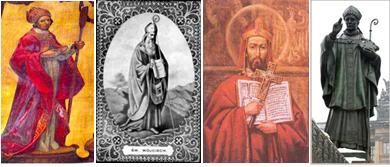 ST. ADALBERT (WOJTECH) OF PRAGUE (b Bohemia 956, d Poland 997)
ST. ADALBERT (WOJTECH) OF PRAGUE (b Bohemia 956, d Poland 997)
Bishop, Missionary and Martyr
Born to a noble family in Bohemia, the future saint was educated by St. Adalbert of Magdeburg,
and at the age of 27 was named of Bishop of Prague. Eight years later he was exiled at the
instigation of those who opposed his clerical reforms. Popular clamor brought him back but
he was exiled once again because he excommunicated the murderers of a woman accused of
adultery who had sought sanctuary in a church. He went to Hungary first to preach and then
carried his mission to the peoples along the Baltic Sea. For chopping down some oaks sacred
to the local pagans, he was killed by pagan priests in what was then part of Prussia (now
part of Poland). His body was ransomed by Poles who buried him in Gniezno Cathedral, but
his remains were taken to St. Vitus Cathedral in Prague in the mid-11th century. He is
highly venerated in the Czechoslovakian lands, Poland, Hungary and Germany.
Readings for today's Mass:
usccb.org/bible/readings/042212.cfm
AT THE VATICAN TODAY
Regina caeli - The Holy Father reflected on Jesus's second appearance to the Apostles after the Resurrection
and his continuing presence in the Eucharist, reminding priests, parents and catechists to prepare their children
well for their First Communion, which in many parishes is usually held in Easter tide. He also called attention
to the beatification in Mexico City yesterday of María Inés Teresa of the Most Blessed Sacrament, who founded the
Clarissan Missionaries of the Most Blessed Sacrament.
|
| |
 23/04/2012 04:43 23/04/2012 04:43 |
|
| | | OFFLINE | | Post: 24.709
Post: 7.238 | Registrato il: 28/08/2005
Registrato il: 20/01/2009 | Administratore | Utente Master | |
|

 REGINA CAELI TODAY
REGINA CAELI TODAY
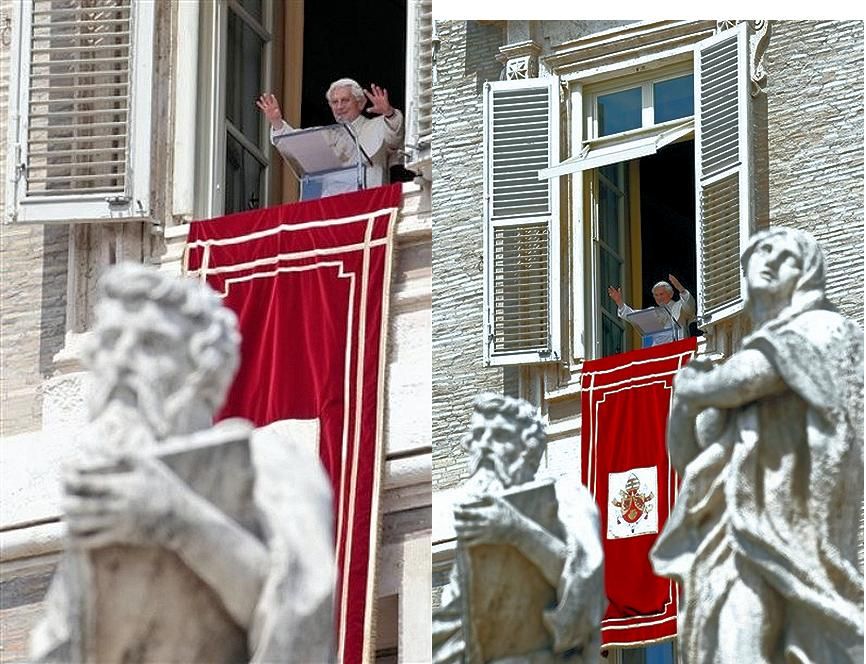 Being authentic witnesses to Christ
Being authentic witnesses to Christ

April 22, 2012
Our ability to recognize the Risen Lord through His Word and in the Eucharist was the focus of Pope Benedict XVI’s Regina Caeli reflections this third Sunday of Easter. This is how he synthesized the reflection in English:
In today’s Gospel, the risen Lord opens the minds of the disciples to the meaning of his suffering and death, and sends them out to preach repentance. With courage and joy, may we too be authentic witnesses to Christ. God bless all of you!
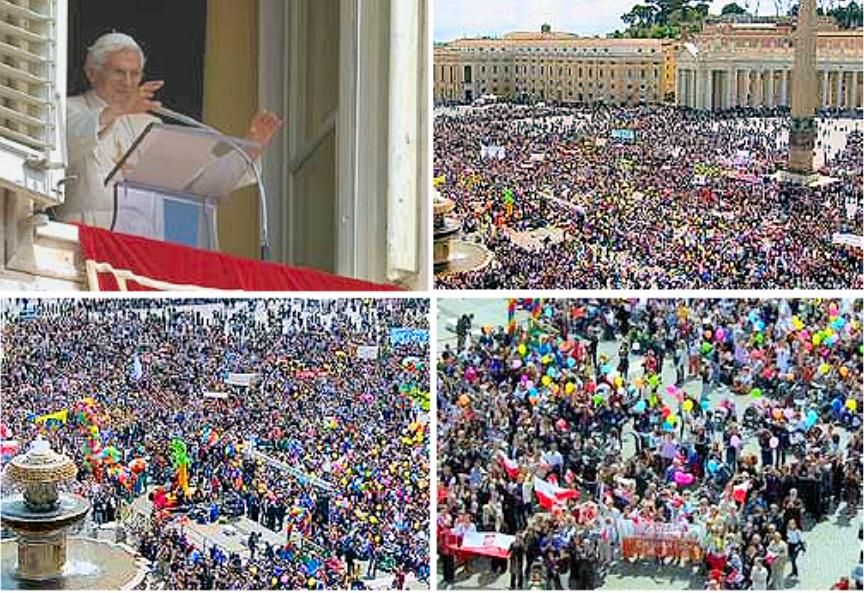
St Peter’s Square, below the Pope’s study window was packed, mainly with young children from parishes across the diocese of Rome, who are preparing for their First Communion. They had gathered beneath his balcony early Sunday morning, building up to the midday appointment with the Holy Father with song, and adding splashes of color to square with bunches of balloons.
And they were not disappointed. Speaking to them directly before the recitation of the Regina Caeli, which replaces the Angelus during the period between Easter and Pentecost, Pope Benedict urged "parish priests, parents and catechists to prepare this feast of faith, with great fervor, but with sobriety." This day is to be memorable as the moment when ... you too understand the importance of a personal encounter with Jesus".
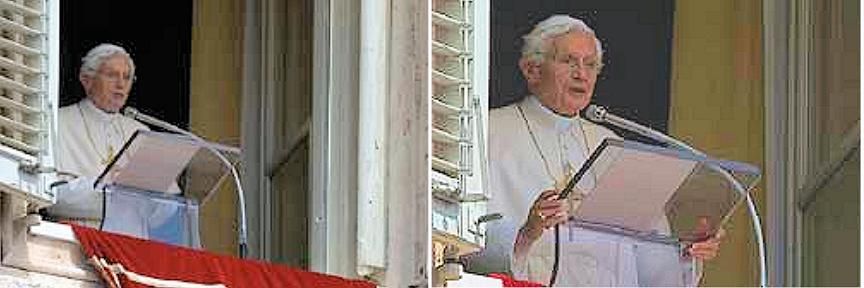
Here is Vatican Radio's translation of the Pope's reflection today:
Dear brothers and sisters!
Today, the third Sunday of Easter, in the Gospel according to Luke, we meet the risen Jesus who comes in the midst of the disciples (cf. Lk 24,36), who were incredulous and frightened, thinking they were seeing a ghost (cf. Lk 24, 37).
Romano Guardini writes: "The Lord has changed. He does not live as before. His existence ... it is not understandable. Yet it is corporal, including ... his whole life experience, his lived destiny, his passion and his death. Everything is real. Albeit changed, but always tangible reality" (The Lord. Meditations on the person and the life of Our Lord Jesus Christ, Milan 1949, 433).
Since the resurrection has not erased the marks of crucifixion, Jesus shows his hands and feet to the Apostles. And to convince them, he even asked for something to eat. So the disciples offered him a piece of baked fish, and he took it and ate it before them" (Luke 24.42-43).
St. Gregory the Great says that "the fish grilled over a fire does not mean anything other than the passion of Jesus, Mediator between God and men. In fact, he deigned to hide in the waters of the human race, agreed to be caught in the snare of our death, and it was as if he were set on fire for the pain suffered at the time of His Passion" (Hom. in Evang. XXIV, 5: CCL 141, Turnhout 1999, 201).
Thanks to these very realistic signs, the disciples overcome their initial doubt and open up to the gift of faith, and this faith allows them to understand the things written about Christ "in the law of Moses, the Prophets and the Psalms" (Luke 24,44).
We read that Jesus "opened their minds to understand the Scriptures and said to them: 'Thus it is written that the Christ would suffer, and rise from the dead on the third day. and that repentance, for the forgiveness of sins… You are witnesses of these things"(Lk 24,45-48).
The Saviour assures us of his real presence among us through the Word and the Eucharist. Therefore, just as the disciples of Emmaus recognized Jesus in the breaking of the bread (cf. Lk 24:35), so we meet the Lord in the Eucharistic celebration. In this regard, St. Thomas Aquinas explains that " It is absolutely necessary to confess according to Catholic faith that the entire Christ is in this sacrament.... since the Godhead never set aside the assumed body" (S.Th. III q. 76, a. 1).
Dear friends, the Church at Easter time, usually administers First Communion to children. I therefore urge the pastors, parents and catechists to prepare this feast of faith well, with great fervor, but also with simplicity. "This day is to be memorable as the moment when ... you too understand the importance of a personal encounter with Jesus" (Post Synodal ap.exort. Sacramentum Caritatis, 19).
May the Mother of God help us to listen attentively to the Word of the Lord and participate worthily in the Eucharistic Sacrifice, to become witnesses of the new humanity.
After the prayers, he said:
I am happy to recall that yesterday in Mexico, Maria Ines Teresa del Santisimo Sacramento (1904-1981) was declared Blessed. She founded the Clarissan Missionaries of the Most Holy Sacrament. Let us give thanks to God for this exemplary daughter of Mexico, which I had the joy of visiting recently and which I will always carry in my heart.
Today in Italy, we observe a day dedicated to the Università Cattolica del Sacro Cuore, with the theme this year, "The future of the nation in the heart of the youth". It is important that young people are formed in values in addition to scientific and technical knowledge. For this, Fr. Agostino Gemelli founded the Catholic University, which I wish to be abreast of the times but always faithful to its origins.
At the end, he had this special greeting:
I affectionately greet Italian-speaking pilgrims, especially the group 'Bambini in missione di pace' (Children on a mission of peace) accompanied here today by the Honorable Mayor of Rome, Gianni Alemanno, Thank you for your joy.
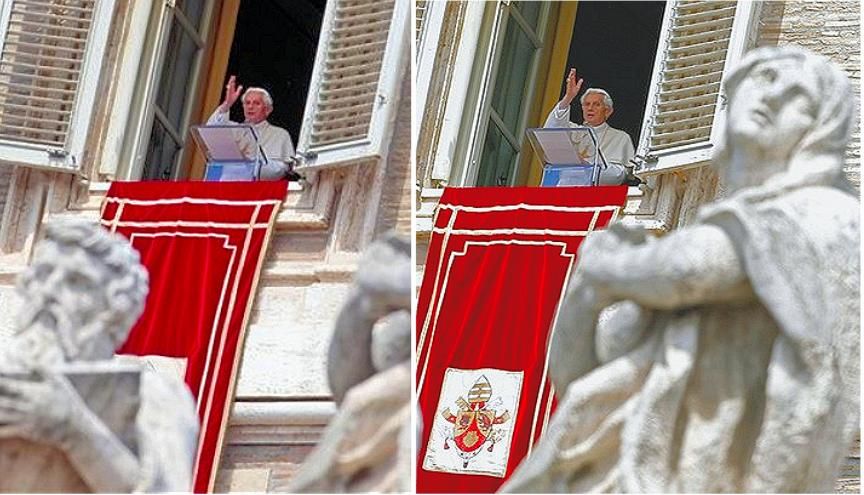 [Modificato da TERESA BENEDETTA 23/04/2012 04:44] |
| |
 23/04/2012 05:17 23/04/2012 05:17 |
|
| | | OFFLINE | | Post: 24.710
Post: 7.239 | Registrato il: 28/08/2005
Registrato il: 20/01/2009 | Administratore | Utente Master | |
|
 The premises of this story are all wrong - starting with the media ploy of seeing a whole summer in one swallow - compounded by peddling all the usual stereotypes about the disciplinarian Pope versus the poor victimized heroic nuns who are 'stunned' by the 'Vatican crackdown' on them - as if they had not been riding for this fall all these years, becoming more and more obnoxious and 'un-female' as they blithely flaunt their proud defiance of anything in Catholicism that they reject and despise...
The premises of this story are all wrong - starting with the media ploy of seeing a whole summer in one swallow - compounded by peddling all the usual stereotypes about the disciplinarian Pope versus the poor victimized heroic nuns who are 'stunned' by the 'Vatican crackdown' on them - as if they had not been riding for this fall all these years, becoming more and more obnoxious and 'un-female' as they blithely flaunt their proud defiance of anything in Catholicism that they reject and despise...
I hoped I did not have to post anything more about these neutered women - pardon the expression - after reporting that the Vatican would proceed to discipline them, but for all the faults of this report, it does make a good point about how more and more bishops are now willing to exercise their authority to curb insubordination and heretical tendencies in their dioceses, and not let the Vatican do all the work... I am not using the article's ridiculous title, though, which was 'Is Pope Benedict suffering from the seven-year-itch?'...
Sanctions for liberal UN nuns' leadership
revive old chestnuts about the Pope

WASHINGTON, April 20 (RNS) -- As Pope Benedict XVI marked his seventh anniversary as Pope on Thursday many Catholics were wondering if the Pontiff is finally becoming the papal enforcer that some feared -- and others hoped -- he would be when he was elected to lead the Church in 2005. ['Many Catholics'? Speak for yourself, unnamed reporter, and don't project your opinions to 'many Catholics' who are not motivated like you to find an 'angle' on which to hang your story.]
The questions were prompted by this week's announcement that Benedict had signed off on a crackdown on the organization representing most of the 57,000 nuns in the United States, saying that the group was not speaking out strongly enough against gay marriage, abortion and women's ordination.
But does this latest move indicate that the man once known as the Grand Inquisitor is returning to form, or that a new wave of dissent is emerging?
The investigation of the Leadership Conference of Women Religious was launched by the Congregation for the Doctrine of the Faith, the Vatican agency charged with overseeing orthodoxy, and the department that Benedict -- then Cardinal Joseph Ratzinger -- led for nearly a quarter century before his election.
During his time there, and as a top aide to the late Pope John Paul II, Ratzinger oversaw a range of investigations into priests, theologians, nuns and church groups perceived as straying too far left for Rome's conservative tastes.
That earned Ratzinger, a German theologian, a host of epithets, such as the "Panzerkardinal" and "God's Rottweiler" -- harsh nicknames that Ratzinger's fans considered badges of honor.
In the years after his election, however, there was almost a sense of disappointment among some on the Catholic right that Benedict was not moving swiftly and sharply to crack down on liberal dissidents.
One reason for that perception was that as Pope, Benedict has to be a pastor to his global flock more than a disciplinarian. "It was easy to know the doctrine. It's much harder to help a billion people live it," as he told a dinner companion a year after his election.
Another reason for the relative lack of tough talk coming from Rome during the early years of Benedict's papacy is that he had already done much to quell dissent. The Pax Romana that he helped install has meant that theologians and Church officials know there will be consequences if they step out of line. At the same time, the Vatican has installed more conservative bishops who are willing to do the disciplining themselves.
In the U.S., bishops in recent years have taken action against a number of theologians, most notably last year when the bishops' doctrine committee sharply criticized the work of a highly regarded theologian, Sister Elizabeth Johnson, saying it contained "misrepresentations, ambiguities, and errors."
Last month, Spanish bishops warned Catholics that the writings of one of the country's best-known theologians, the Rev. Andres Torres Queiruga, were "distorting" certain "elements of the faith of the church" and should not be read.
In short, local Church authorities are now doing the work that the Vatican used to do, and there has been less of that work to do.
Still, there are signs that may be changing.
In countries like Ireland, Austria and even Benedict's native Germany, hundreds of priests who think the church is not doing enough to stanch the exodus of Catholics from the pews are forming organizations aimed at explicitly opening up debate on -- or overturning -- church teachings on priestly celibacy, women's ordination, and other topics the Vatican considers off-limits.
After watching these developments for a couple of years, Benedict may have had enough.
Earlier this month on Holy Thursday, Benedict issued an unusual and direct public rebuke of a prominent group of dissident Austrian priests who say they represent about 10 percent of the country's clergy.
Also this month, it was revealed that the Vatican had silenced two outspoken priests from the Redemptorist order. One of the priests, the Rev. Tony Flannery, has been an outspoken critic of the clergy sexual abuse crisis in Ireland and is also a founder of the Association of Catholic Priests, a new group of some 800 priests that has challenged church teachings*.
At the same time, the Vatican also indicated it is nearing a reconciliation with a controversial right-wing splinter group of Catholic traditionalists who would much prefer to return to life before the Second Vatican Council (1962-1965) revamped church teachings and upended centuries of tradition.
Whether the crackdown on the LCWR is another sign of a renewed Roman assertiveness is unclear. Much may depend on whether the American nuns find a way to accommodate the Vatican's demands, or whether the campaign sparks the kind of backlash that the pope is facing in other countries.
In its response issued Thursday, LCWR officials said they were "stunned" by the Vatican action and called this "a moment of great import for religious life and the wider church." They asked for "prayers as we meet with the LCWR National Board within the coming month to review the mandate and prepare a response."
[ My problem with these Irish dissident priests is that they appeared to have been silent until after the Cloyne Report was released in 2011 - and suddenly they were spearheading protests against sexual abuse of children. But the facts about Cloyne were known all along and well publicized, before the government investigation even began. Where was their outrage then? Isn't this is all so hypocritical?
As I understand it, even Flannery did not speak out publicly on the abuse issue until the Irish Prime Minister delivered his boorish and largely erroneous address to the Irish Parliament last year, and then Flannery spoke up and said, "Me too! I agree with Kenny completely. The Vatican is the vilest of all human institutions!"
In fact, the ACP was only established in Sept. 2010, and their founding manifesto is typical Catholic protest rhetoric with the usual demands. It says that among other things it will work for are (note the fancy rhetoric that dresses up their demands):
• Full implementation of the vision and teaching of the Second Vatican Council, with special emphasis on:
-the primacy of the individual conscience...
• A redesigning of Ministry in the Church, in order to incorporate the gifts, wisdom and expertise of the entire faith community, male and female.
• A re-structuring of the governing system of the Church,
• A re-evaluation of Catholic sexual teaching and practice that recognizes the profound mystery of human sexuality and the experience and wisdom of God’s people...
They are not the first dissidents, of course, to cite Vatican=-II and then ascribe their own ideas to it. Since when did Vatican-II advocate 'the primacy of the individual conscience'????... BTW, the reason that ACP had an instant membership of around 800 is that it is an offshoot of previous failed reform associations of Irish priests.
|
| |
 23/04/2012 06:12 23/04/2012 06:12 |
|
| | | OFFLINE | | Post: 24.711
Post: 7.240 | Registrato il: 28/08/2005
Registrato il: 20/01/2009 | Administratore | Utente Master | |
|

 Seven years of Benedict XVI:
Seven years of Benedict XVI:
The Pope we need for our time
by Lucetta Scaraffia
Translated from

April 22, 2012
Does it make sense that a person without theological preparation like me would try to evaluate one of the most important theologians of our time, Joseph Ratzinger? And, with some trepidation, I say Yes. Without a doubt.
All his work, in fact, is addressed not just to the narrow world of specialists but to all his contemporaries - be they believers or non-believers - and arises from the questions raised by our time.
His essays and books are thought out for all of us, contemporaries of this great theologian who is able to analyze our time and to seek the answers that Christian culture can and should find. They are texts written in clear and limpid language, understandable even to general readers who are drawn to read them because they discover answers to questions that have always been inevitable, that they have always sensed vaguely but could never express.
Joseph Ratzinger's words are like a clear and patient light, bringing to mind the words 'kindly light' from John Henry Newman - the intellectual English convert whom Joseph Ratzinger had always loved and admired and whom Benedict XVI personally beatified in England in September 2010. It is a light that brings readers clarity on the fundamental questions of life framed in the context of today.
Much of this comes from the fact that Benedict XVI was, for years, a professor, and therefore used to making himself heard by young minds, and who was, by all accounts, an excellent teacher. He was, above all, very open - allowing for diverse viewpoints and the many possible interpretations of a subject under discussion.
"Discussion reigned supreme," recalls Fr. Vincent Twomey, who was one of Prof. Ratzinger's doctoral students in Regensburg. "For every proposition, he would weigh all the possible objections, both historical as well as from contemporary theologians. He considered all opinions and hypotheses presented, even from the latest newcomer."
The publication of Joseph Ratzinger's Collected Writings - which is ongoing - is an operation of great cultural importance, not just religious, because these writings are proof of the present Pope's character as an intellectual of great depth, one who is truly and properly exceptional among the long list of Popes.
Not since Leo the Great - i.e., not for fifteen centuries - has such a man become Pope who had reflected so profoundly as a theologian on the role of the Church and the faith during his time, a wise man who has sought to understand in depth the world in which he lives.
Such a Pope was necessary for this historical moment, and it is difficult not to acknowledge this. Modernity, in fact, is above all, a crisis of sense, or reason - a cultural fracture that begins with the very way man thinks of himself.
It was not enough that the Church maintained its role as faithful custodian of tradition - something more was needed, a leap of lucidity in order to find a way to explain the patrimony of tradition to the contemporary world, and to do so required an intellectual who understand this world in depth.
The writings of Joseph Ratzinger are, above all, a history of this process of understanding, and above all, the search for a Christian response that would be adequate to stand up to modernity and secularization.
It is also the proof that at a moment of religious crisis as serious as that we are experiencing, it is important, indeed necessary, that he who has become the visible head of the Church possess the qualities of pastor, intellectual, theologian and wise man.
By reading his works, we can understand his thinking, and by doing so, all his decisions and actions as Pope become clear. But we can also understand ourselves better as human beings living in modern times, in a cultural atmosphere that ignores the truth and therefore does not even look for it.
[Modificato da TERESA BENEDETTA 24/04/2013 17:57] |
| |
 23/04/2012 09:13 23/04/2012 09:13 |
|
| | | OFFLINE | | Post: 24.712
Post: 7.241 | Registrato il: 28/08/2005
Registrato il: 20/01/2009 | Administratore | Utente Master | |
|
 When Joseph Ratzinger was 12, a Bavarian came to live in the Apostolic Palace and stayed there for the next 19 years as the literal and functional keeper of the keys of access to Pope Pius XII, preceding the election of the Bavarian Pope by 66 years. The fascinating story of this Bavarian nun, Mother Pascalina (Josephine) Lehnert (1894-1983) is told in a film that Ignatius Press is releasing on DVD in its English version. The film is based on a 2007 biography of the nun published in Germany.
'God's mighty servant':
When Joseph Ratzinger was 12, a Bavarian came to live in the Apostolic Palace and stayed there for the next 19 years as the literal and functional keeper of the keys of access to Pope Pius XII, preceding the election of the Bavarian Pope by 66 years. The fascinating story of this Bavarian nun, Mother Pascalina (Josephine) Lehnert (1894-1983) is told in a film that Ignatius Press is releasing on DVD in its English version. The film is based on a 2007 biography of the nun published in Germany.
'God's mighty servant':
A film on Pius XII's
secretary and housekeeper

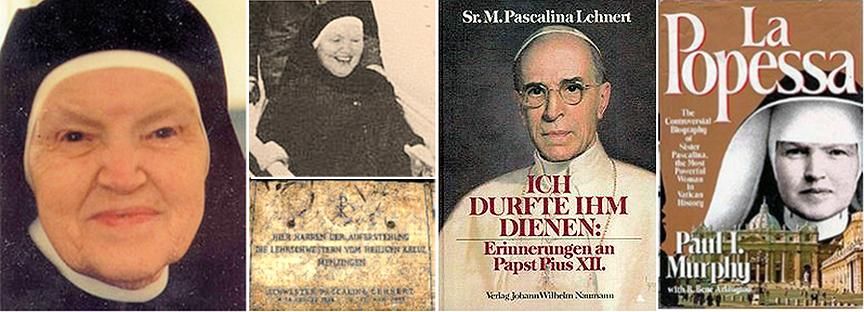
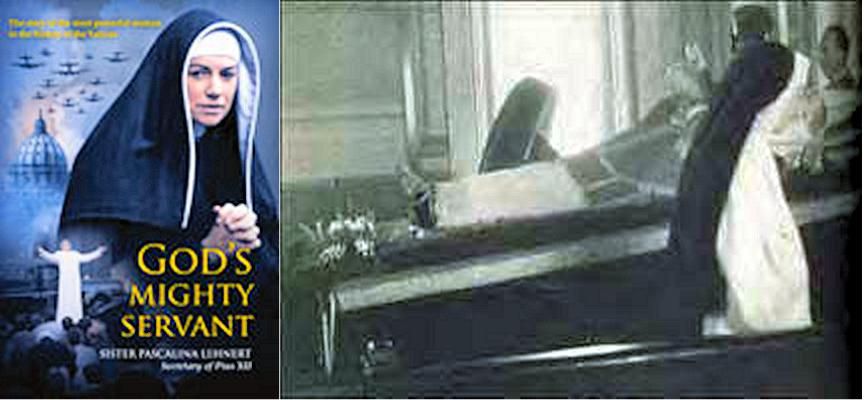 Top panel, from left: Pascalina at age 88, one year before her death; arriving in Rome for John XXIII's funeral in 1963 (and below it, her tombstone in the Vatican's German cemetery); her 1959 memoir about Pius XII; and a 1983 biography that first brought widespread public attention to 'La Popessa' (the picture on the cover is Pascalina as a young nun}. Bottom panel, the DVD; right photo, Mother Pascalina (background), sits watch after Pius XII died in Castel Gandolfo.
Top panel, from left: Pascalina at age 88, one year before her death; arriving in Rome for John XXIII's funeral in 1963 (and below it, her tombstone in the Vatican's German cemetery); her 1959 memoir about Pius XII; and a 1983 biography that first brought widespread public attention to 'La Popessa' (the picture on the cover is Pascalina as a young nun}. Bottom panel, the DVD; right photo, Mother Pascalina (background), sits watch after Pius XII died in Castel Gandolfo.
Here is the blurb from Ignatius Press about the DVD:
This is the amazing story of Sister Pascalina Lehnert (1894-1983) who was the housekeeper, personal confidant and secretary to Pope Pius XII for 40 years, when he was the Papal Nuncio in Germany, and then after for his whole Pontificate. The Pope had great confidence in her wisdom, energy and loyalty, and she became known as "the most powerful woman in the history of the Vatican."
In 1918, the young nun Pascalina was sent to Munich to be the housekeeper of the new Papal Nuncio, Eugenio Pacelli. Though they seemed to have little in common, Pacelli became impressed by Pascalina's directness, zeal and alertness. During his delicate negotiations on the Concordat with Bavaria and Prussia, he benefits from Pascalina's pertinent comments and clear-headed views. He is sad to leave her behind when he is appointed Cardinal Secretary of State in 1929 and moves to Vatican City - where women are forbidden to live.
But Pascalina's loyalty and strong support are missed, and she is invited to work in the Vatican - the first woman ever to do so. As part of Pacelli's Vatican household, she contends with the intrigues and rivalries of men who resent the privileges she enjoys and the power she wields. But all in-fighting soon pales before the horrors of the war, which begins the same year that Pacelli is elected Pope and becomes Pius XII.
As the war tears Europe apart, the Pope puts his life, and the papacy itself, on the line by opposing the Nazis and fascists. Visiting the injured, steering through plots and conspiracies, he relies heavily on Sister Pascalina, his most important link to the world of the suffering and the persecuted. Thanks to the fearlessness of Rome's clergy and the tirelessness of Pascalina, he manages to save the lives of many Roman Jews. As head of the private papal charity, Pascalina uses her organizational skills to help thousands. She remains at Pacelli's side until his death in 1958, as his most important confidante, valued adviser and friend - God's mighty servant to the end. Starring Christine Neubauer, Remo Girone, Wilfried Hochholdinger, Renato Scarpa.
It is said that as soon as Pius XII died, the cardinals in charge during the sede vacante asked Mother Pascalina to vacate the Vatican ASAP. She retired to Vienna where she died of a cerebral hemorrhage when she was 89. She was brought back to the Vatican to be buried in the Camposanto Teutonico (German cemetery) in the Vatican Gardens. Cardinal Ratzinger was among those who attended her funeral.
A bit more about Mother Pascalina may be gleaned from Wikipedia:
en.wikipedia.org/wiki/Pascalina_Lehnert
The information about her work directing Pius XII's personal charities, especially in aiding refugees and persecuted Jews during the war, is particularly impressive.
[Modificato da TERESA BENEDETTA 23/04/2012 09:18] |
| |
 23/04/2012 10:27 23/04/2012 10:27 |
|
| | | OFFLINE | | Post: 24.713
Post: 7.242 | Registrato il: 28/08/2005
Registrato il: 20/01/2009 | Administratore | Utente Master | |
|

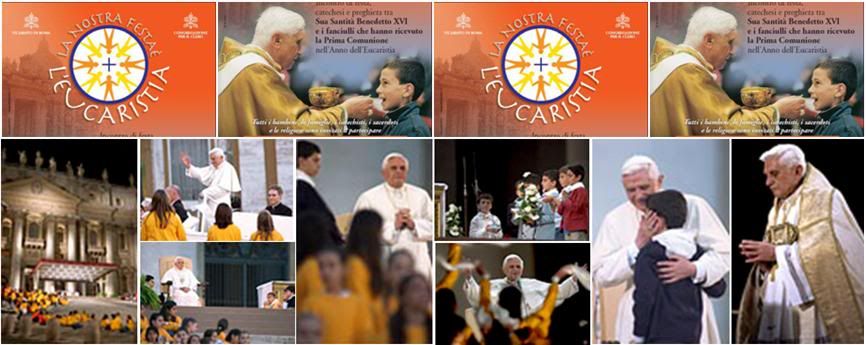 Pope Benedict speaks to Roman children about First Communion, St. Peter's Square, October 2005.
News on RV about one of our Forum friends, Ann Engelhart, who has now illustrated two children's books presenting Benedict XVI's talks to children, edited by another friend of the Forum, Amy Welborn....
When Pope Benedict
Pope Benedict speaks to Roman children about First Communion, St. Peter's Square, October 2005.
News on RV about one of our Forum friends, Ann Engelhart, who has now illustrated two children's books presenting Benedict XVI's talks to children, edited by another friend of the Forum, Amy Welborn....
When Pope Benedict
speaks to children...

April 22, 2012
Pope Benedict XVI celebrated his 7th anniversary as Pope this year. Before becoming Archbishop of Munich, the then Father Joseph Ratzinger was a Professor of theology at several university faculties in Germany. His papacy has been marked by his sublime theological observations in his speeches and homilies.
What surprises many people is that he can also articulate profound ideas on a level young children can understand. This was demonstrated in his first year as Pope, when he answered questions in St. Peter’s Square from children about to receive their first Holy Communion.
“I was intrigued at the thought of the scholar speaking to young children,” said artist Ann Engelhart. “When I heard he would be speaking to these children in Rome, I thought I would love to hear what he has to say to them. It was a very important conversation directed to children, but on their level.”
She soon contacted writer Amy Welborn to speak about collaborating on a book about the encounter.
“It was a beautiful event. I wanted to be able to make it available to children and families in a format that would be usable for them,” Engelhart told Vatican Radio.
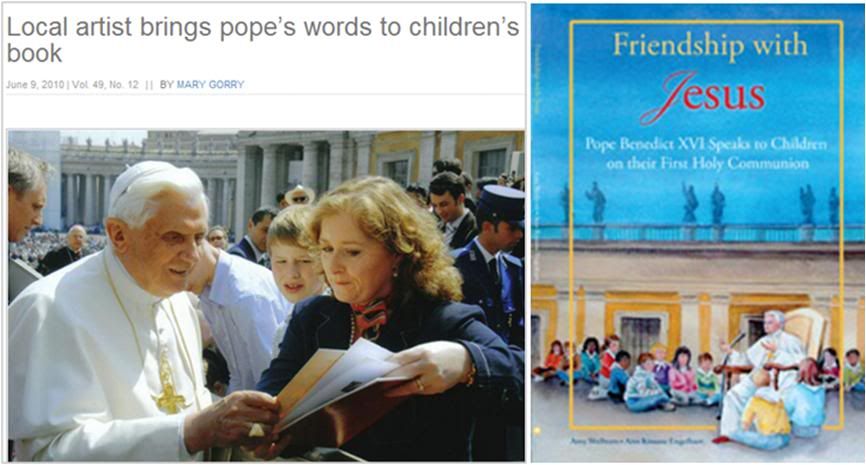 Ann was able to show the Pope a mock-up of the First Communion book with some of her illustrations at a GA in 2009. The book was first published by CTS in the UK in time for the Pope's September 2010 visit. The Holy Father's talk to English schoolchildren in Twickenham became the subject for Ann's next B16-for-kids book with Amy Welborn, "Be saints!", which came out last January.
Ann was able to show the Pope a mock-up of the First Communion book with some of her illustrations at a GA in 2009. The book was first published by CTS in the UK in time for the Pope's September 2010 visit. The Holy Father's talk to English schoolchildren in Twickenham became the subject for Ann's next B16-for-kids book with Amy Welborn, "Be saints!", which came out last January.
The book is called Friendship With Jesus: Pope Benedict XVI Speaks to Children on their First Holy Communion. It is a picture book which combines the words of the Pope with wonderful watercolour paintings by Engelhart.
“It was a very important conversation directed to children, but on their level. As always, Pope Benedict doesn’t really talk down to children, he speaks to them.”
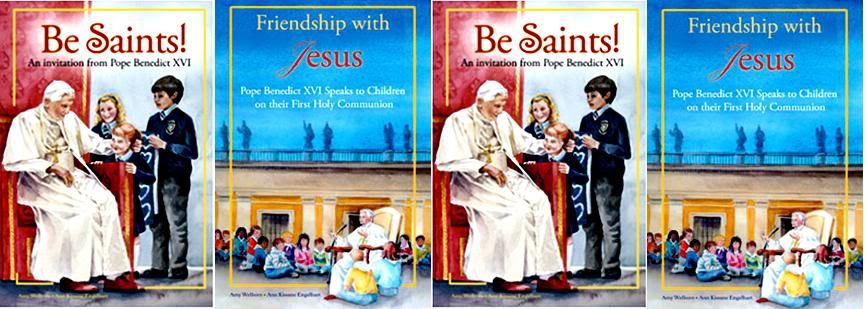
[Modificato da TERESA BENEDETTA 23/04/2012 12:21] |
| |
 23/04/2012 11:22 23/04/2012 11:22 |
|
| | | OFFLINE | | Post: 24.714
Post: 7.243 | Registrato il: 28/08/2005
Registrato il: 20/01/2009 | Administratore | Utente Master | |
|
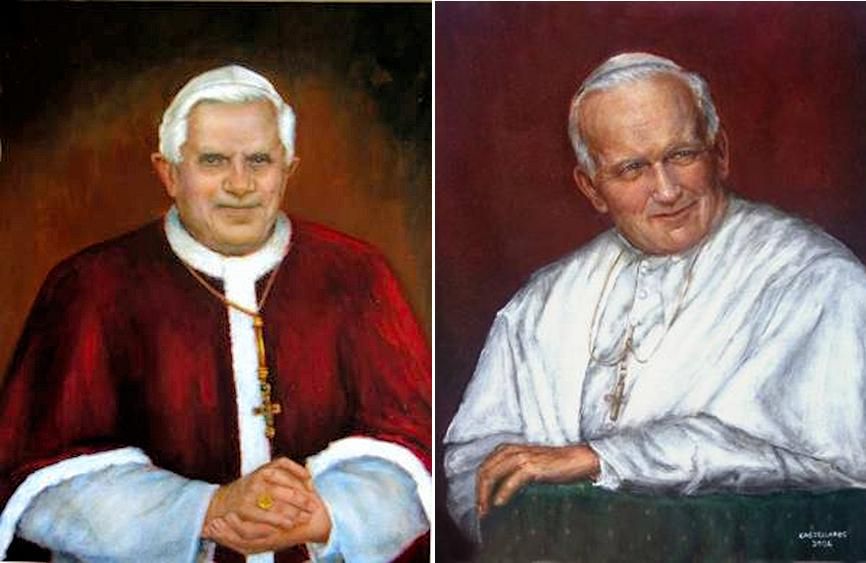 Castellanos portraits of Benedict XVI and John Paul II.
Castellanos portraits of Benedict XVI and John Paul II.
Papal portraiture:
Cuban-American painter completes
B16 portrait for April anniversaries
by Pauline Tovey
 Diocesan newspaper of Arlington, Virginia
Diocesan newspaper of Arlington, Virginia
Issue of April 4, 2012
Since childhood, Cuban-American portraitist Sylvia Castellanos has been intrigued by the human face. That fascination and her love of drawing have led her to paint hundreds of portraits — from Washington, D.C., dignitaries to Central American Maya campesinos.
And with each portrait, her hope is to capture the person’s soul. Not a small task in itself, but her objective became even more challenging when she chose to paint the Church’s spiritual leaders Blessed John Paul II and Pope Benedict XVI.
“I had a personal desire to paint the popes because this is my Church and these are the leaders of my Church,” said Castellanos, who began painting Pope John Paul II in the last months of his life.
“I was in my 20s when he was elected pope,” she said. “You would have to have been there to understand the significance of this young pope who liked to ski and mountain climb, who was so vibrant, alert and intelligent.
“With the passage of time, he had become this old man with Parkinson’s disease who could hardly walk.
“I wanted to try to catch something to bring back into people’s consciousness that this was the real man and this is how he deserves to be remembered,” she said.
Since Castellanos immigrated with her family to the United States from her native Havana at age 9, she said she was “especially interested that John Paul came from a country enslaved by communism.”
“I learned later that he was doing things behind the scenes to fight communism, and that made him especially dear to me.”
After she completed the portrait in 2006, it was exhibited for five years at Pope John Paul II Cultural Center in Washington, where she received much praise for capturing the pope’s essence. She values such compliments highly, especially since she never met Pope John Paul, nor his successor, Pope Benedict, whom she began painting in 2010.
Mostly self-taught, Castellanos painted her first “commissioned” portrait at the age of 13. Her portrait of Abraham Lincoln for a school project drew the attention of her principal, who commissioned her to do a portrait of the assistant principal for $10.
Years later, after obtaining a graduate degree from Princeton University in New Jersey, Castellanos moved to the Washington metro area in the early 1970s. For the remainder of the decade she served as research director of the Senate Steering Committee while doing commissioned portraits for prominent people on Capitol Hill, including Congressional members and international personnel. During those years she studied with portraitist Danni Dawson at the Torpedo Factory in Alexandria.
“That was the only study of art I have ever done,” said Castellanos. “She taught me the things fundamental to my outlook.”
“I seek to catch emotions in the way a perfume maker captures a fragrance so that by uncorking a bottle, people can experience again the full dimension of the scent,” said Castellanos.
To capture the essence of Pope Benedict, Castellanos pored through photographs.
“People who have met Benedict talk about the kindness and holiness he gives off. I wanted to catch that,” she said.
Castellanos completed her first portrait of the Pope late in 2010, but after carefully observing viewers’ reactions, Castellanos was dissatisfied with her work. She stored the painting for a year and half until this past January when she began repainting his face from scratch. This time she’s pleased with the result.
“The whole point of doing a portrait is to capture the person, his emotions and who the person is. If you don’t do that, it’s not a good portrait,” Castellanos said. “People say I’ve got the likeness now, and I hope that is the case.”
With two important dates coming up for Pope Benedict — his birthday April 16 and the anniversary of his ascension to the papacy April 19 — Castellanos hopes she can find the right place, possibly in Washington, to exhibit her work.
“The Church will be marking both these events, and maybe my painting can have a small role in whatever form its commemoration takes,” she said.
Her ultimate ambition is for the painting to be exhibited at the Basilica of the National Shrine of the Immaculate Conception in Washington.
Castellanos hopes her portrait of Pope Benedict will appeal to those outside Catholic circles, as well.
“To the extent that it’s seen by non-Catholics, I hope they will appreciate the personal quality that I tried to include,” she said.
“And when they look at it they will say, ‘so this is what he is like as a person.’”
There have not been too many portraits of Benedict XVI that have been publicized. The following are those we have reported about in the PRF and this Forum through the years - two of them date from 2005, the other 3 from 2007:

From left:
1. Portrait painted by Igor Babailov, Russian-American, for the Pope's 80th birthday. It was kept at the Apostolic Nunciature in Washington, DC, and the Pope saw it when he visited in 2008. Babailov was allowed to attend a General Audience close to the Pope to do his studies for the portrait.
2. Portrait painted by Natalia Tsarkova, Russian artist commissioned by the Vatican Museums to do this portrait, presented to the Pope at the Vatican in December 2007. Tsarkova had previously painted a portait of John Paul II acquired by the Vatican Museums. She is the first woman known to have painted a papal portrait.
3. Portrait painted by Ulisse Sartini, Italian artist, who did this on his own, in 2005, when he was commissioned by the Vatican Museums to paint the portrait which was executed by Vatican artisans into the mosaic painting that was added to the gallery of papal mosaic portraits running across the top of the walls inside the Basilica of San Paolo fuori le Mure.
4. British painter Michael Noakes who was commissioned by the Vatican in 2005 to paint the portrait shown - it is supposed to have been the first official portrait of the Pope. The Pope sat for Noakes in 2006 although the portrait was not done till 2007. All these years, I have been unable to find a photograph of the portrait by itself.
5. Pope Benedict with Sartini's original tondo portrait on the day its corresponding mosaic was installed inside St. Paul's Basilica.
Addendum: By coincidence, Tsarkova painted Benedict XVI the year he turned 80, since the portrait of John Paul II that she did was commissioned for his 80th birthday in 2000. Of course, benedict is painted as he looked at the time, whereas John Paul II, already showing the ravages of advanced Parkinson's at the time, is shown in a idealized timeless context.
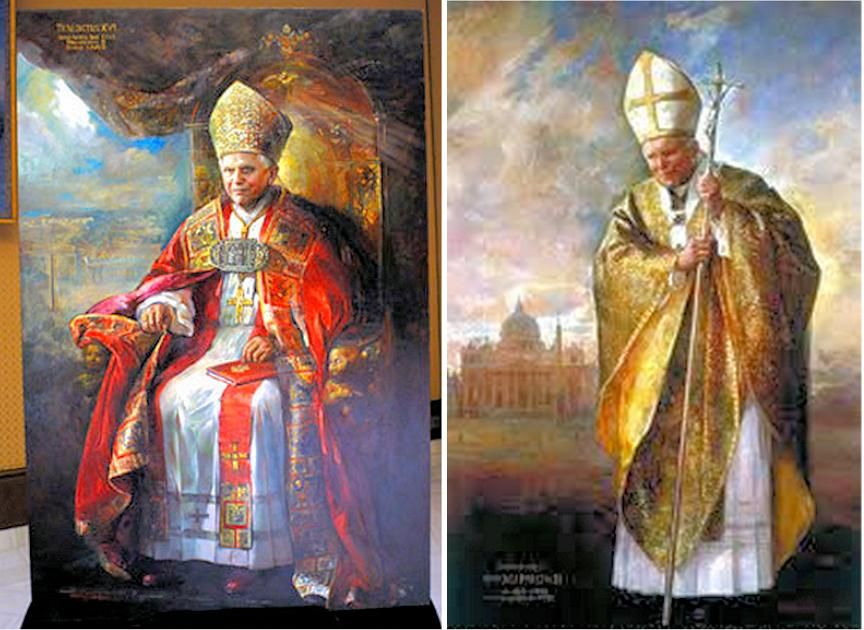 Tsarkova said at the time she presented the portrait to Benedict XVI in 2007 that 'he liked the angels best'. The artist had decided to depict the cherubs that are a distinctive feature of the Leo XIII 'throne' Benedict is shown on, as celestial presences hovering next to the seated Pope. Although I can discern a Crucifix in the heavenly montage, I cannot discern the Holy Spirit (who is carved at the top of the chairback), but the picture resolution is not clear enough. I love the artist's fantasy in painting the celestial presences! Perhaps she advanced in spiritual awareness since doing the JPII portrait, in which the background is St. Peter's Basilica.
Tsarkova said at the time she presented the portrait to Benedict XVI in 2007 that 'he liked the angels best'. The artist had decided to depict the cherubs that are a distinctive feature of the Leo XIII 'throne' Benedict is shown on, as celestial presences hovering next to the seated Pope. Although I can discern a Crucifix in the heavenly montage, I cannot discern the Holy Spirit (who is carved at the top of the chairback), but the picture resolution is not clear enough. I love the artist's fantasy in painting the celestial presences! Perhaps she advanced in spiritual awareness since doing the JPII portrait, in which the background is St. Peter's Basilica.
[Modificato da TERESA BENEDETTA 23/04/2012 13:35] |
| |
 23/04/2012 11:40 23/04/2012 11:40 |
|
| | | OFFLINE | | Post: 24.715
Post: 7.244 | Registrato il: 28/08/2005
Registrato il: 20/01/2009 | Administratore | Utente Master | |
|
 PAPAL LITURGICAL CELEBRATIONS IN APRIL-JUNE 2012
PAPAL LITURGICAL CELEBRATIONS IN APRIL-JUNE 2012
APRIL
April 29
IV Sunday of Easter
09:00 St. Peter's Basilica
Holy Mass with Ordination of Roman priests
MAY
May 13
VI Sunday of Easter
Pastoral Visit to Arezzo-LaVerna-San Sepolcro
May 27
Pentecost Sunday
09:30 St. Peter's Basilica
Holy Mass
Santa Messa
JUNE
June 1-3
Pastoral Visit to Milan
VII World Encounter of Families
June 3 Sunday
Solemnity of the Most Holy Trinity
Holy Mass to conclude the VII WEF
June 7, Thursday
Solemnity of Corpus Domini
17:00 Basilica of St. John Lateran
Holy Mass. followed by
Procession to Santa Maria Maggiore
and Eucharistic Benediction
June 29, Friday
Solemnity of Saints Peter and Paul
09:00 St. Peter's Basilica
Holy Mass and
Imposition of the Pallium on New metropolitan Bishops
|
| |
 23/04/2012 16:33 23/04/2012 16:33 |
|
| | | OFFLINE | | Post: 24.716
Post: 7.245 | Registrato il: 28/08/2005
Registrato il: 20/01/2009 | Administratore | Utente Master | |
|

 Monday, April 23, Third Week of Easter
Monday, April 23, Third Week of Easter
 ST. GEORGE (b Roman Palestine 281, d Nicomedia [now part of Turkey] 303), Soldier and Martyr
ST. GEORGE (b Roman Palestine 281, d Nicomedia [now part of Turkey] 303), Soldier and Martyr
One of the most popular saints especially in the Orthodox world, he is probably also the best-known of military saints.
His father was a famous Roman commander in Palestine in the time of Emperor Diocletian, and his mother was Judean,
but the family was Christian. George presented himself to the Emperor Diocletian in Nicomedia, then the eastern capital
of the Roman Empire, to be a soldier, and he soon became a member of his Palace Guard. However, the emperor decreed
in 302 that all Christians in the Roman army be arrested and offer sacrifices to the pagan Gods. George refused and
professed his faith before the emperor, who sought to bribe him with money and lands to change his mind. Diocletian
had no choice but to order his execution. He underwent many tortures including being dragged through the streets
before he was beheaded. His body was brought back to Palestine where Christians venerated him as a martyr. His cult
spread throughout the eastern Roman Empire and reached the west in the 5th century. He was canonized by Pope Gelasius I
in 494. The Crusades brought him new fame when the Crusaders rebuilt the fourth century basilica erected in his honor.
Chivalric orders dedicated to him sprung up all over Western Europe. England's Edward II put the Order of the Garter
under St. George's patronage, and by the 12th century, England's ships were flying the Cross of St. George. His name was
an English battlecry during the Hundred Years War. Today he is the patron saint of England, Greece, Portugal, and
Russia, among others. Images of St. George are all based on the legend of St. George and the dragon, akin to ancient
fables of a hero slaying a dragon to save a princess from death.
Readings for today's Mass:
usccb.org/bible/readings/042312.cfm
AT THE VATICAN TODAY
The Holy Father met with
- Cardinal Leonardo Sandri, Prefect of the Congregation for Oriental Churches.
- Nine US bishops from the states of Washington and Alaska in northwest USA (Region XII)
on ad limina visit
The Vatican released the text of the Holy Father's message to the VII World Congress on Pastoral Ministry
in Tourism taking place in Cancun, Mexico, from April 23-27.
[Modificato da TERESA BENEDETTA 23/04/2012 16:35] |
| |
 23/04/2012 16:56 23/04/2012 16:56 |
|
| | | OFFLINE | | Post: 24.717
Post: 7.246 | Registrato il: 28/08/2005
Registrato il: 20/01/2009 | Administratore | Utente Master | |
|

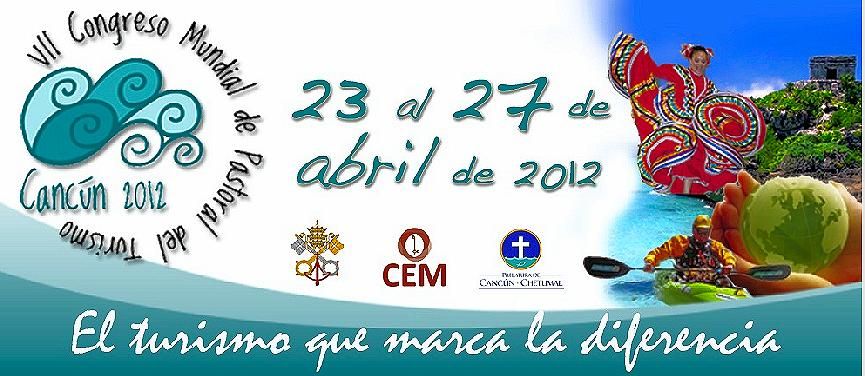 Benedict XVI to bishops:
Benedict XVI to bishops:
Pastoral care of tourism
includes fighting
'sexual tourism and traffic'

April 23, 2012
Pope Benedict XVI has sent a message to the participants in the VII World Congress on the Pastoral Care of Tourism, which is taking place in Cancún, Mexico, from the 23rd to the 27th of April. The Vatican Press Office provided the following English translation of the original in Spanish:
To my Venerable Brothers
His Eminence Cardinal Antonio Maria Vegliò
President of the Pontifical Council for the Pastoral Care
of Migrants and Itinerant People
and the Most Reverend Pedro Pablo Elizondo Cárdenas
Prelate-Bishop of Cancún-Chetumal
On the occasion of the VII World Congress on the Pastoral Care of Tourism which will take place in Cancún (Mexico) from 23 to 27 April, I am pleased to send you my cordial greeting which I extend to my Brother Bishops and to all those taking part in this important meeting.
As you begin these days of reflection on the pastoral attention which the Church dedicates to the area of tourism, I wish to convey my spiritual closeness to the participants and my respectful greetings to the civil authorities and to the representatives of the international organizations that are also present at this event.
Tourism is certainly a phenomenon characteristic of our times, due both to the important dimensions that it has already achieved and in view of its potential for future growth. Like other human realities, it is called to be enlightened and transformed by the Word of God.
For this reason, moved by pastoral solicitude and in view of the important influence tourism has on the human person, the Church has accompanied it from its first beginnings, encouraging its potential while at the same time pointing out, and striving to correct, its risks and deviations.
Tourism, together with vacations and free time, is a privileged occasion for physical and spiritual renewal; it facilitates the coming together of people from different cultural backgrounds and offers the opportunity of drawing close to nature and hence opening the way to listening and contemplation, tolerance and peace, dialogue and harmony in the midst of diversity.
Travelling reflects our being as homo viator [traveling man]; at the same time it evokes that other deeper and more meaningful journey that we are called to follow and which leads to our encounter with God.
Travelling, which offers us the possibility of admiring the beauty of peoples, cultures and nature, can lead to God and be the occasion of an experience of faith, "for from the greatness and beauty of created things comes a corresponding perception of their Creator" (Wis 13,5).
On the other hand tourism, like every human reality, is not exempt from dangers or negative dimensions. We refer to evils that must be dealt with urgently since they trample upon the rights of millions of men and women, especially among the poor, minors and handicapped.
Sexual tourism is one of the most abject of these deviations that devastate morally, psychologically and physically the life of so many persons and families, and sometimes whole communities.
The trafficking of human beings for sexual exploitation or organ harvesting as well as the exploitation of minors, abandoned into the hands of individuals without scruples and undergoing abuse and torture, sadly happen often in the context of tourism.
This should bring all who are engaged for pastoral reasons or who work in the field of tourism, and the whole international community, to increase their vigilance and to foresee and oppose such aberrations.
In the Encyclical Letter Caritas in Veritate, I chose to situate the reality of international tourism in the context of integral human development. "We need, therefore, to develop a different type of tourism that has the ability to promote genuine mutual understanding, without taking away from the element of rest and healthy recreation" (no. 61).
May your Congress, meeting precisely under the banner 'Tourism that makes a difference', contribute to the development of a pastoral approach that will lead steadily to that "different type of tourism".
I would like to highlight three areas which should receive full attention from the pastoral care of tourism.
Firstly, we need shed light on this reality using the social teaching of the Church and promote a culture of ethical and responsible tourism, in such a way that it will respect the dignity of persons and of peoples, be open to all, be just, sustainable and ecological.
The enjoyment of free time and regular vacations are an opportunity as well as a right. The Church, within its own sphere of competence, is committed to continue offering its cooperation, so that this right will become a reality for all people, especially for less fortunate communities.
Secondly, our pastoral action should never loose sight of the via pulchritudinis, "the way of beauty". Many of the manifestations of the historical and cultural religious patrimony are "authentic ways to God, Supreme Beauty; indeed they help us to grow in our relationship with him, in prayer. These are works that arise from faith and express faith"(General Audience, 31 August 2011).
It is important to welcome tourists and offer them well-organized visits, with due respect for sacred places and the liturgical action, for which many of these works came into being and which continues to be their main purpose.
Thirdly, pastoral activity in the area of tourism should care for Christians as they enjoy their vacations and free time in such a way that these will contribute to their human and spiritual growth.
Truly this is "an appropriate moment to let the body relax and to nourish the spirit with more time for prayer and meditation, in order to grow in personal relationship with Christ and become ever more conformed to his teachings" (Angelus, 15 July 2007).
The new evangelization, to which all are called, requires us to keep in mind and to make good use of the many occasions that tourism offers us to put forward Christ as the supreme response to modern man’s fundamental questions.
I therefore encourage you to ensure that pastoral activity in the field of tourism is integrated, as it ought in all justice, as part of the organic, ordinary pastoral activity of the Church. In this way, by the coordination of projects and efforts, we will respond in greater fidelity to the Lord’s missionary mandate.
With these sentiments, I entrust the fruits of this Congress to the powerful intercession of the Mary Most Holy under the title of Our Lady of Guadalupe and, as a pledge of abundant divine favours, I cordially impart to all present the requested Apostolic Blessing.
From the Vatican
April 18th 2012

 |
| |
 23/04/2012 22:37 23/04/2012 22:37 |
|
| | | OFFLINE | | Post: 24.719
Post: 7.247 | Registrato il: 28/08/2005
Registrato il: 20/01/2009 | Administratore | Utente Master | |
|

 Seven years of Papa Ratzinger:
Seven years of Papa Ratzinger:
'The simple faith of a very fine theologian'
by Marina Corradi
Translated from the 4/19/12 issue of

He knew him long before he became Pope. But in the 1980s, Joseph Ratzinger was, to Cardinal Ersilio Tonini, 98 this year and the world's oldest living cardinal, not just the Prefect of the Vatican's premier dicastery, but also "the German cardinal with a kind face who was never absent at any important meeting or seminar at the Vatican".
"He was always attentive and kind, but a man of few words - someone who preferred to listen instead of putting in his word," he adds.

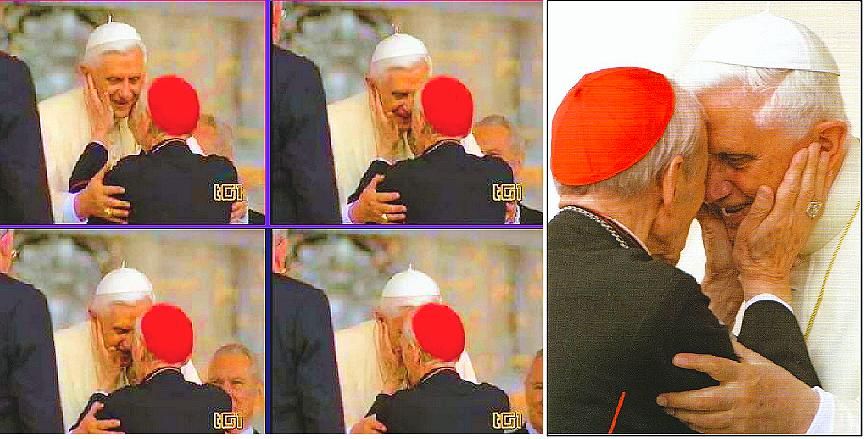 At one of the first General Audineces held by Benedict XVI in 2005, Cardinal Tonini famously showed his affection for the Pope. It reminded me of a Chinese patriarch giving his blessing to a younger though more eminent man....
At one of the first General Audineces held by Benedict XVI in 2005, Cardinal Tonini famously showed his affection for the Pope. It reminded me of a Chinese patriarch giving his blessing to a younger though more eminent man....
For the emeritus Archbishop of Ravenna-Cervia, who marks his 98th birthday on July 20, the Pope is almost like a younger brother. Listening to him speak about Benedict XVI, one senses not just a great sympathy but almost an affinity between them - Tonini, born to peasant parents in Piacentina, and Joseph Ratzinger, born to lower middle-class parents in rural Bavaria.
"I liked his gentleness and his south German amiability," he continues. "And his spontaneous way of drawing people to him. The year I was asked to preach the Lenten spiritual exercises to the Roman Curia, I would use German expressions once in a while, since I know the language. He would smile at me from his seat, as if to encourage me or perhaps just happy to hear his native tongue spoken in an unlikely setting.".
Or perhaps the two already shared another common language - the popular piety that both had inherited from their parents , a faith that is profound and is tenacious even through crisis and testing.
In 2005, Tonini did not take part in the Conclave because he was 11 years over voting age. [In fact, John Paul II only made him a cardinal in 1994, after his 80th birthday]. But he attended the general congregations of the cardinals who met daily in the two weeks preceding the Conclave, with Cardinal Ratzinger presiding as Dean of Cardinals.
"He synthesized for us the overall situation of the universal Church and the challenges that the new Pope would have to confront. As I listened to him, I considered how competent and measured and lucid his interventions were. And i said to myself, 'The new Pope could very well be him'."
As he is. Seven years have passed. Yesterday (April 18), Tonini celebrated his 75th year as a priest. He was ordained in 1937 when the future Pope was just 10 years old. (One feels light-headed to hear the words of someone who is among the very few in the Church hierarchy older than the Pope, who at 85 almost seems young.]
In the relative quiet of the Istituto Santa Teresa [the retirement home in Ravenna where Tonini lives], the cardinal goes on: "He is a gentle person, the Pope, but courageous. Not one to speak in thunderous tones, but when he has to say something, he says it clearly. As he demonstrated in the way he confronted the pedophile-priest scandal. With clear unequivocal words, but never accusatory, rather, with a tone of sorrow."
"In the 1980s, I read one of his first books, Introduction to Christianity, and was struck by his limpid logic and writing, devoid of any rhetorical artifice. It is the same style I find in JESUS OF NAZARETH - a sim0licity that goes with great theological depth".
One says to him: "Eminence, those two volumes on Jesus seem to find their ideal incipit [opening statement] in one of the first lines in Benedict XVI's first encyclical, Deus caritas est: 'Being Christian is not the result of an ethical choice or a lofty idea, but the encounter with an event, a person, which gives life a new horizon and a decisive direction'. One hears the urgency to bear witness to men all over about the concrete historicity of Jesus and what is narrated in the Gospels".
"Yes, it is the foundation of Christianity itself, for all time, but every generation needs to see it being testified to all over. The more so with our generation, with its experience of positivism, rationalism/ That is why, in 2005, the Church needed not just a pious man [to be Pope] but someone who also had the pulse, the precise perception of the historical situation, of the challenges of the third millennium, so that Christianity can be embodied, as it must, always and ever anew, in human history".
That professor and theologian of few words, that cardinal who was "much listened to and favored by John Paul II", has reminded men once again of ancient truths, Tonini observed.
"First of all, a Pope from Germany is better able to judge the level of secularization which has been growing in Europe, of the need to repropose the faith in words that are comprehensible today - and that has been the great objective in everything he does.
"That passionate conjugation of faith and reason that he taught us in Regensburg; the splendid discourse to the secular intelligentsia of France in the College des Bernardins, when he compared our time to that in Greece when St. Paul spoke at the Areopagus - that even if the streets today are no longer filled with images of multiple gods, it is even worse that for many, God is unknown. Or, as the Pope said then, 'The actual absence of God is tacitly beset by the questions raised about him'."
"Thus, quaerere Deum - seek God - as the Pope reiterated in Paris, invoking an existential urgency in that medieval convent which goes back to the roots of Western Christianity. To seek God with faith and reason, while warning, us in a common thread that goes on to Caritas in veritate, that reason without faith is destined to lose itself in the illusion of its own omnipotence"
And this seems to be a theme dear to Tonini, who is a passionate follower of developments in bioethics and assisted reproduction, in which he sees a hubris, a defiance of man's own nature, namely, the fact that he is God's creature.
He points out that there is here "an echo of our similar provenance, which is popularly rooted but profoundly Christian, which is why Cardinal Ratzinger, though he is not Italian, always seemed very familiar to me".
It's a Christian matrix inherited from centuries of tradition, which, for Tonini, also explains a fundamental trait of this Pope: "He is a man who fears nothing - he trusts God and the Church, he has firm confidence in Providence."
He sees the basic origins of the Pope's faith illustrated also in his choice of the Curate of Ars as the inspiration and model for the Year for Priests: "Consider that parish priest, that humble country priest - what an enlightened and profound conscience he had! So, you see how Ratzinger's roots keep flowering forth during his Pontificate."
But he also notes that this Pope who has centuries of tradition and popular faith behind him, also wrote Spe salvi in which he asks himself and us, almost provocatively, "whether Christian hope truly works in us today, if that hope is concrete enough to begin to transform the present".
"The urgency that this man feels to announce today that everything is true: the birth, the death, the resurrection of Jesus. The urgency of impressing those truths on us... You see, the Spirit truly breathed on the Conclave. We needed a Christian like him - a theologian but a simple one, a professor but a son of the people. One of those, I am convinced, who is particularly dear to God, because they trust in him and are fearless because of this".
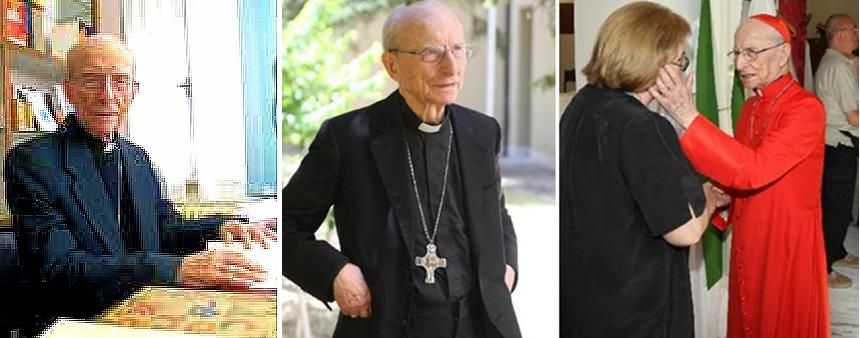 Left photo, Tonini at 90; Center and right, Tonini on his 96th birthday in 2010.
In an interview that the cardinal gave on his 96th birthday in July 2010, he said this of Benedict XVI:
Left photo, Tonini at 90; Center and right, Tonini on his 96th birthday in 2010.
In an interview that the cardinal gave on his 96th birthday in July 2010, he said this of Benedict XVI:
He is one of the most learned men in the world, one of the best prepared, even if he almost dissimulates his immense competencies. It is a great virtue. I first met him in Rome when I gave the Lenten exercises for bishops and cardinals, and he was a bishop. I am very proud of his commitment. He is a great man, like John Paul II was. He is attentive, reserved, with a very quick and acute intelligence - he is a saint who has always given his neighbor primacy.
And about Cardinal Tonini himself, this is what he told 30 GIORNI when he turned 90 in 2004:
Today I am born again, I celebrate my birth. But to tell the truth, every morning I am always born again. And the wish that I make for myself is to hold on to this serenity until the end, because I’m happy to be in the world…
I’ve had the good luck because my mother taught me to wake up full of astonishment. I’m very happy to be in the world, it’s a great miracle. I wish that the people I meet had the same joy I do.
BTW, between Cardinal Tonini, soon to be 98, and Mons. Loris Capovilla (John XXIII's private secretary) who is 96, a shoutout to all nonagenarians who remain as sharp-minded as they are, and the perennial wish that Benedict XVI too will be blessed with 'multos annos' more!
[Modificato da TERESA BENEDETTA 24/04/2012 11:23] |
| |
 24/04/2012 08:09 24/04/2012 08:09 |
|
| | | OFFLINE | | Post: 24.720
Post: 7.248 | Registrato il: 28/08/2005
Registrato il: 20/01/2009 | Administratore | Utente Master | |
|

 The MSM kneejerk reflex to say "He's baaaaack - the Panzer-Pope!" was typified by the Religion News Service article I posted earlier on this page...
The Pope moves towards the SSPX and
The MSM kneejerk reflex to say "He's baaaaack - the Panzer-Pope!" was typified by the Religion News Service article I posted earlier on this page...
The Pope moves towards the SSPX and
against those radical feminist nuns:
Is the old ‘reactionary’ back again?
No, those clichés are as silly as ever -
Joseph Ratzinger has always said ‘no’ to heresy:
but only so the Church could say ‘Yes’ to God
By William Oddie

Monday, 23 April 2012
Last week, rather to my surprise, Pope Benedict became, at 85, the oldest Pope in the last 110 years. He is, furthermore, one of only six to reign past 85 in the last 600 years.
Last week was an interesting week for him: if you had just reported it as though the last seven years hadn’t happened, it might have been taken as a confirmation of what many expected on his election: that he would be, in the words of one commentator, a “ruthless enforcer” of orthodoxy.
Firstly, the possibility emerged that there really might be an agreement to heal the rift between the Holy See and the SSPX, possibly by establishing it as a prelature, along the lines of Opus Dei.
Seven years ago, any such possibility would have been explained by many as a confirmation of the Pope’s unyieldingly reactionary temperament. Nobody says that now.
The second evidence of the Pope’s rottweiler remperament would have been last week’s crackdown on the Leadership Conference of Women Religious, the main umbrella group of women’s orders in the United States.
This was after a three year doctrinal assessment by the CDF, as a result of which Cardinal Levada declared that there was a situation of “crisis ….characterized by a diminution of the fundamental Christological center”.
There was “a prevalence of … radical feminist themes incompatible with the Catholic faith …. theological interpretations that risk distorting faith in Jesus and his loving Father … including commentaries on ‘patriarchy’ which distort the way in which Jesus has structured sacramental life in the Church; others even undermine the revealed doctrines of the Holy Trinity, the divinity of Christ, and the inspiration of Sacred Scripture.”
So: at the same time as a convergence with the fSSPX, a crackdown on all those non-habit-wearing radical religious: absolutely typical, no? Well not quite. As the liberal commentator John L Allen pointed out in the National Catholic Reporter:
"If we take the last seven years into view, not just the last week, the picture changes considerably. Quite often, the most intriguing feature of this papacy isn’t how Benedict has confirmed expectations, but rather how he’s confounded them.…
"Cardinal Joseph Ratzinger, the great “Doctor No” of the Catholic church in his quarter-century as the Vatican’s doctrinal czar, has actually turned out to be the pope of what I’ve termed “Affirmative Orthodoxy.” It’s an approach to church teaching that emphasizes the Catholic “yes” — putting the accent on what Catholicism supports and affirms rather than what it opposes and condemns."
Allen illuminatingly quoted the Pope himself:
Firstly, you have to know what we really want, right? Christianity, Catholicism, isn’t a collection of prohibitions: it’s a positive option.
It’s very important that we look at it again because this idea has almost completely disappeared today. We’ve heard so much about what is not allowed that now it’s time to say: we have a positive idea to offer …
I believe we need to see and reflect on the fact that it’s not a Catholic invention that man and woman are made for each other, so that humanity can go on living: all cultures know this.
As far as abortion is concerned, it’s part of the fifth, not the sixth, commandment: “Thou shalt not kill!” We have to presume this is obvious and always stress that the human person begins in the mother’s womb and remains a human person until his or her last breath. … But all this is clearer if you say it first in a positive way.
All this took me back to the astonishment that greeted Pope Benedict’s first encyclical, Deus Caritas Est, in both the Catholic and the secular media.
The Guardian’s report, I see from my files, was headed “Pope surprises Catholics with warm words on power of love”. It was written by Stephen Bates, the Guardian’s religious Affairs correspondent, himself a liberal Catholic, and its tone of gratified amazement reflected the general reaction among Catholics hostile to the overall direction of the pontificate of John Paul II, and particularly to the Congregation for the Doctrine of the Faith and its supposedly cold-hearted former prefect.
“Pope Benedict XVI thawed his previously chilly image yesterday” wrote Bates, “by producing as his first message to his worldwide flock a notably warm rumination on the nature of love. Deus Caritas Est … was greeted last night with some astonishment and relief among senior Catholics”.
The encyclical’s message, opined Bates, “was far from the finger-wagging ‘thou shalt not’ tone that characterised some of his predecessor’s pronouncements and contrasted with Benedict’s stern reputation…”.
True enough: the tone of the encyclical did, as we all vividly remember, belie the Pope’s “stern reputation”: but where, it had to be asked, did that come from? The answer is that the cold-hearted “Panzer-Cardinal” Ratzinger of former times was from beginning to end a media construct.
But what the press constructs, the press can deconstruct: and there followed a media makeover unequalled since Dickens published the final instalment of The Christmas Carol, and mean old Ebenezer Scrooge, transformed by the Spirit of Christmas, astonished and slightly terrified the Cratchit family by turning up on Christmas day with a huge turkey (the encyclical was signed on Christmas Day).
“There never was such a turkey”; wrote Dickens: “there never was such an encyclical” almost wrote The Tablet.
So: what was going on? Monsignor Andrew Faley, the assistant general secretary of the Bishops’ Conference of England and Wales, said “We are seeing the substance of the man as a pastor and shepherd of the flock. A cuddly Benedict? Well, well”. [Part of the problem is that most reporters are unable to see people and events as anything but black or white - they do not see a middle ground, or a gray area, in any argument, because they are too polarized themselves to see a middle ground anywhere or to be capable of seeing gray, much less nuances.]
The fact was of course that the Pope was being just as pastoral as prefect of the CDF when he said “no’ to some new heresy. As for being “less prescriptive”, Deus Caritas Est was just as prescriptive as anything the former Panzer-Cardinal ever published, prescriptive exactly as Our Lord was prescriptive when he gave us his “new commandment, to love one another as I have loved you”.
This was no soft-centered “cuddly Benedict”; the Pope still had a spine, as we have seen over the years that followed. He was exactly the same Joseph Ratzinger as he had always been.
There was no contradiction: as he wrote as Prefect of the CDF in 1993, “Christianity is at its heart a radical ‘yes,’ and when it presents itself as a ‘no,’ it does so only in defence of that ‘yes’.”
The secular world does not, of course, WANT a radical Christian “yes”; it wants a “yes” not to the love of God but to our own “personal choices”; and so, it has to be said does the secularising fifth column within the Catholic Church (including the American Leadership Conference of Women Religious).
There was always a limit to the Pope’s new 'cuddliness'. There was no change in direction, as that old curmudgeon Hans Kung correctly diagnosed at the time.
Thus, having praised the encyclical’s “solid theological substance” he also grumbled that the Pope had failed to mention the charity the church should show toward loving couples who use contraception, and those who divorce and remarry.
Poor old Kung, he didn’t get it then, and he doesn’t get it now; he knows what he believes and has stuck to it through thick and thin. But so does the Pope, the Lord be praised.
[Modificato da TERESA BENEDETTA 24/04/2012 11:17] |
| |
 24/04/2012 08:56 24/04/2012 08:56 |
|
| | | OFFLINE | | Post: 24.721
Post: 7.249 | Registrato il: 28/08/2005
Registrato il: 20/01/2009 | Administratore | Utente Master | |
|
 Benedict XVI reflects on the truth
Benedict XVI reflects on the truth
and inspiration of the Bible
By James V. Schall, S.J.

April 23, 2012
The annual meeting of the Pontifical Biblical Commission this year was devoted to the topic of “the inspiration and truth of the Bible.” The Holy Father gave a brief comment to the commission members on April 18. [See the English translation of the Holy Father's messge at the bottom of the preceding page.]
This theme of inspiration and truth is needed for a correct interpretation of the Bible's message. The Bible itself is a product of the Church and Tradition; it was not first written and then the Church appeared.
The Church appeared in an organized way. It subsequently recalled and recorded the essential teaching of the Christ and the apostles. The ultimate origin of the Bible is not human but is found in the Logos, in the Word of God. But this origin does not prevent God also from using human instruments. This is what Matthew, Mark, Luke, John, and Paul are about.
Inspiration is an “act of God” in such a manner that the human words express the words of God. Inspiration is decisive in any adequate approach to Holy Scripture. More is found here than simply the words of men, though human words are there.
If we only look at the human words, we do not see what is most important and precious about them. We do not see that they “come from God.” They teach us about the beginning and the end and the ways in between.
In Verbum Domini, the Pope remarked that the Council fathers placed the idea of inspiration in the context of truth in Scripture. The latter is not just a series of stories or disparate texts. It is a whole. If we attend to inspiration, we will also pay more attention to the truth found in Scripture. The notion that we can have a Scripture that is in opposition to truth undermines the very notion of what Scripture if about.
Through the charism of inspiration, the books of the Bible have a direct and forceful appeal to us. Yet, the Word of God is not confined to what is written. If revelation had concluded with the death of the last apostle, the revealed words continue to be announced and interpreted in the tradition of the Church. Scripture is not a dead text to be investigated as something solely of the past, of the time in which it was written — as something antiquarian.
For this reason, the Word of God fixed in the sacred texts is not an inert deposit within the Church. It becomes the supreme rule of its faith and the power of life.
Tradition that draws its origin from the apostles progresses with the assistance of the Holy Spirit and increases with the reflection and the study of believers, with the experience of spiritual life, and the preaching of the bishops.
In the study of the theme of inspiration and truth, the commission is called to offer its own specific and qualified contribution to this necessary deepening. In fact, this endeavor is essential and fundamental for the life and mission of the Church.
Sacred texts need to be interpreted according to their nature. Inspiration and truth are constitutive characteristics of this nature. The Word of God needs to be welcomed, known, and studied.
The brief comment of the Pope on inspiration and truth does not range widely over the whole area of biblical studies and their limits. What it does do — and this is characteristic of Benedict XVI — is to insist that we are given Scripture for one reason: to know the truth.
Scripture is not mere myth, or piety, or poetry, or historical record. It is the locus of the truth of our being, its ultimate origin and end. If we do not see this truth there, we will find its fullness in no other source.
The purpose of inspiration is not inspiration itself. It is that we may know the truth about God, the cosmos, and ourselves. [Modificato da TERESA BENEDETTA 24/04/2012 09:10] |
| |
 24/04/2012 09:37 24/04/2012 09:37 |
|
| | | OFFLINE | | Post: 24.722
Post: 7.250 | Registrato il: 28/08/2005
Registrato il: 20/01/2009 | Administratore | Utente Master | |
|

 Constantine's story is inseparably linked to his mother, the Empress Helena, whose efforts led to the discovery of the tomb where Jesus was believed to have been buried (over which the Church of the Holy Sepulchre was built) and who brought back relics of the True Cross and, Tradition says, the Holy Robe of Christ, from the Holy Land to Europe. Both Constantine and Helena are cinsdered saints in both the Byzantine and Roman churches.
Religious freedom: Why a battle
Constantine's story is inseparably linked to his mother, the Empress Helena, whose efforts led to the discovery of the tomb where Jesus was believed to have been buried (over which the Church of the Holy Sepulchre was built) and who brought back relics of the True Cross and, Tradition says, the Holy Robe of Christ, from the Holy Land to Europe. Both Constantine and Helena are cinsdered saints in both the Byzantine and Roman churches.
Religious freedom: Why a battle
1,700 years ago is relevant today
by Cindy Wooden

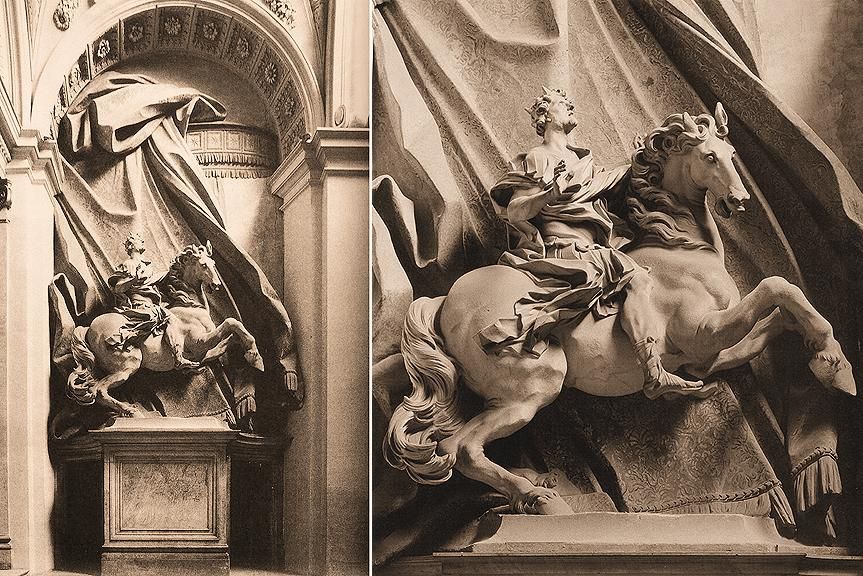 Gian Lorenzo Bernini's statue of Constantine in the portico of St. Peter's Basilica. Constantine is shown looking up at the vision of a cross in the sky in Rome in 312, an event that led to his conversion and the legalization of Christianity.
Gian Lorenzo Bernini's statue of Constantine in the portico of St. Peter's Basilica. Constantine is shown looking up at the vision of a cross in the sky in Rome in 312, an event that led to his conversion and the legalization of Christianity.
VATICAN CITY, April 19 (CNS) -- For Vatican historians, the roots of a Christian idea of religious liberty go way back: in fact, back 1,700 years to the Emperor Constantine's victory on Rome's Ponte Milvio (Milvian bridge) and to his conversion.
At a Vatican conference in late April marking the anniversary, the head of the Pontifical Committee for Historical Sciences said Constantine's victory in 312 under the sign of the cross was "the foundation of a new world" marked by religious freedom for Christians and separation between church and state.
However, Norbertine Father Bernard Ardura, committee president, also admitted that "many centuries would be needed" before there was a widespread recognition of full religious freedom for everyone in a pluralistic society and before a respectful church-state separation was achieved.
In fact, said Cardinal Agostino Vallini, papal vicar for Rome, it wasn't until the Second Vatican Council that the Catholic Church fully, formally recognized everyone's right to religious freedom.
The council's document on religious freedom said: "The human person has a right to religious freedom. This freedom means that all men are to be immune from coercion on the part of individuals or of social groups and of any human power, in such wise that no one is to be forced to act in a manner contrary to his own beliefs, whether privately or publicly, whether alone or in association with others, within due limits."
Even as the international group of historians gathered at the Vatican to discuss the latest scholarship about Constantine's conversion, it was his connection to the modern idea of religious freedom that was seen as most relevant both for the world at large as well as for the Catholic Church.
For example, the U.S. bishops have said the Obama administration is threatening religious freedom by attempting to force Catholic institutions to include contraception -- which the church teaches is immoral -- in health care plans.
And the Second Vatican Council's recognition of religious freedom is one of the sticking points in the ongoing discussions between the Vatican and the traditionalist Society of St. Pius X.
In fact, the U.S. district of the society explained its position April 13 in an article that described as "problematic" a recent statement by the U.S. bishops' Ad Hoc Committee for Religious Liberty.
The SSPX statement said, "As for man's 'liberty,' mankind has been endowed with free will, but only to use for good -- that which corresponds with truth (i.e., Christ and his church) -- but not to do evil.... Error never has any rights. However, the secularistic and anti-Catholic principle of religious liberty denies this reality and instead, makes error equal to truth."
While the Council affirmed traditional Church teaching that people have an obligation to seek the truth, and that the fullness of truth is found in the Catholic Church, it insisted that no one could be forced to accept truth.
Opinions about Constantine's legacy -- and even his conversion -- differ, even among Catholic scholars. Contrasting points of view on the sincerity of Constantine's faith and his impact on the faith of others in the Roman Empire came to the fore quickly during the Vatican conference April 18-20.
While preserving academic decorum at a small Vatican news conference announcing the Constantine congress, two historians agreed that the 4th-century emperor played an important role in the development of the idea of church-state separation, but they did not agree on how he actually did that.
Claire Sotinel, a professor of Roman history at the University of Paris-Est Creteil and one of the organizers of the conference, said, "Constantine's conversion marked a new way of thinking about religion and power. It was a complete break. When Constantine became Christian, it was the first time the ruler (of the Roman Empire) was not also the religious leader."
But Giovanni Maria Vian, a Church historian better known as the editor of L'Osservatore Romano, the Vatican newspaper, said that while Constantine identified himself as a Christian after the battle on the bridge in 312, "he never gave up the (then pagan Roman) title 'Pontifex Maximus,' he continued to preside over pagan rituals and was baptized only on his deathbed."
Still, Vian said, by identifying himself as a Christian and solidifying the rights of Christians to practice their faith, "Constantine made Christianity available to the poor -- the masses -- and not just the elite. He made it possible for the Church to be what it is today."
Vian also said the so-called "Constantinian revolution" wasn't all it is popularly thought to be. The systematic persecution of Christians in the West ended before his reign and Christianity was not proclaimed the official religion of the empire until some 47 years after his death, he said.
Both he and Sotinel dismissed the claims of some historians that far from promoting religious freedom, Constantine's embrace of Christianity, or at least the favors he granted the Church, actually gave birth to centuries of Christian teaching and violence against the Jews.
Sotinel said there is no historical evidence, including in Jewish sources, of anti-Jewish activity on the part of Christians in the empire before the fifth century.
The topic of Constantine and religious freedom will be given even greater attention by historians and church leaders in 2013 when they mark the 1,700th anniversary of the Edict of Milan -- a proclamation of tolerance of Christianity throughout the Roman Empire signed by Constantine and the Emperor Licinius, who ruled the eastern part of the empire.
|
| |
|
|
|
|